Clojure, Plain and Simple
- 1. Ben Mabey Plain & Simple Clojure @bmabey Utah Java User’s Group, Aug 15 2013
- 3. "There are two ways of constructing a software design: One way is to make it so simple that there are obviously no deficiencies, and the other way is to make it so complicated that there are no obvious deficiencies. The first method is far more difficult." Tony Hoare, 1980 Turing Award Lecture
- 4. Clojure is a functional Lisp that targets the JVM and enables simpler software design.
- 5. Clojure is a functional Lisp that targets the JVM and enables simpler software design.
- 8. Macros
- 9. (if (= code :RED) (do (launch-missiles!) (sound-the-alarm!)))
- 10. ‘do’ implies side effects (if (= code :RED) (do (launch-missiles!) (sound-the-alarm!)))
- 11. (if (= code :RED) (do (launch-missiles!) (sound-the-alarm!))) (when (= code :RED) (launch-missiles!) (sound-the-alarm!))
- 12. (defmacro when "Evaluates test. If logical true, evaluates body in an implicit do." [test & body] (list 'if test (cons 'do body)))
- 13. (defmacro when "Evaluates test. If logical true, evaluates body in an implicit do." [test & body] (list 'if test (cons 'do body))) (macroexpand '(when (= code :RED) (launch-missiles!) (sound-the-alarm!)))
- 14. (defmacro when "Evaluates test. If logical true, evaluates body in an implicit do." [test & body] (list 'if test (cons 'do body))) (macroexpand '(when (= code :RED) (launch-missiles!) (sound-the-alarm!))) => (if (= code :RED) (do (launch-missiles!) (sound-the-alarm!)))
- 16. Paradigms as Libraries Design by Contract a’la Eiffel - core.contracts
- 17. Paradigms as Libraries Design by Contract a’la Eiffel - core.contracts Logic Programming a’la Prolog - core.logic
- 18. Paradigms as Libraries Design by Contract a’la Eiffel - core.contracts Logic Programming a’la Prolog - core.logic Lightweight threads + channels a’la Go - core.async
- 19. Paradigms as Libraries Design by Contract a’la Eiffel - core.contracts Logic Programming a’la Prolog - core.logic Lightweight threads + channels a’la Go - core.async Optional/Gradual Type system - core.typed
- 20. Paradigms as Libraries Design by Contract a’la Eiffel - core.contracts Logic Programming a’la Prolog - core.logic Lightweight threads + channels a’la Go - core.async Optional/Gradual Type system - core.typed Actor model a’la Erlang - pulsar
- 21. Paradigms as Libraries Design by Contract a’la Eiffel - core.contracts Logic Programming a’la Prolog - core.logic Lightweight threads + channels a’la Go - core.async Optional/Gradual Type system - core.typed Actor model a’la Erlang - pulsar And more...
- 22. “If you give someone Fortran, he has Fortran. If you give someone Lisp, he has any language he pleases.” Guy Steele
- 23. Clojure is a functional Lisp that targets the JVM and enables simpler software design.
- 27. Chained Access person.getAddress().getState().getCode(); (.. person getAddress getState getCode)
- 28. Chained Access person.getAddress().getState().getCode(); (.. person getAddress getState getCode) Count ’em, 3 vs 1 pair!
- 29. Chained Access person.getAddress().getState().getCode(); (.. person getAddress getState getCode) (macroexpand '(.. person getAddress getState getCode)) (. (. (. person getAddress) getState) getCode)
- 30. Chained Access person.getAddress().getState().getCode(); (.. person getAddress getState getCode) (macroexpand '(.. person getAddress getState getCode)) (. (. (. person getAddress) getState) getCode) Clojure has parens so its Java doesn’t need to
- 31. Multiple Updates person.setFirstName("Ben"); person.setLastName("Mabey"); person.makePresenter(); (doto person (.setFirstName "Ben") (.setLastName "Mabey") .makePresenter)
- 32. Multiple Updates person.setFirstName("Ben"); person.setLastName("Mabey"); person.makePresenter(); (doto person (.setFirstName "Ben") (.setLastName "Mabey") .makePresenter) ‘person’ is implicit to method calls
- 33. Multiple Updates person.setFirstName("Ben"); person.setLastName("Mabey"); person.makePresenter(); (doto person (.setFirstName "Ben") (.setLastName "Mabey") .makePresenter) Again, ‘do’ signifies side effects
- 34. Implementing Interfaces new Runnable() { public void run() { System.out.println("Hello World"); } }; (reify Runnable (run [] (println "Hello")))
- 35. Clojure is a functional Lisp that targets the JVM and enables simpler software design.
- 36. Functional
- 38. Functional Programming with Values First Class Functions
- 39. Functional Programming with Values First Class Functions Laziness
- 40. Functional Programming with Values First Class Functions Laziness
- 41. public static int square(int x) { return x * x; }
- 42. public static int square(int x) { return x * x; } Value
- 43. public static int square(int x) { return x * x; } Value }Pure Function
- 44. public static int square(int x) { return x * x; } import java.util.Date; public static Date oneYearFrom(Date date) { date.setYear(date.getYear()+1); return date; }
- 45. public static int square(int x) { return x * x; } import java.util.Date; public static Date oneYearFrom(Date date) { date.setYear(date.getYear()+1); return date; } Reference Object
- 46. public static int square(int x) { return x * x; } import java.util.Date; public static Date oneYearFrom(Date date) { date.setYear(date.getYear()+1); return date; } Reference Object Mutable! Impure Function with side effects
- 47. public static int square(int x) { return x * x; } import java.util.Date; public static Date oneYearFrom(Date date) { date.setYear(date.getYear()+1); return date; } import org.joda.time.DateTime; public static DateTime oneYearFrom(DateTime date) { MutableDateTime temp = new MutableDateTime(date); temp.addYears(1); return temp.toDateTime(); }
- 48. public static int square(int x) { return x * x; } import java.util.Date; public static Date oneYearFrom(Date date) { date.setYear(date.getYear()+1); return date; } import org.joda.time.DateTime; public static DateTime oneYearFrom(DateTime date) { MutableDateTime temp = new MutableDateTime(date); temp.addYears(1); return temp.toDateTime(); } Value Object
- 49. public static int square(int x) { return x * x; } import java.util.Date; public static Date oneYearFrom(Date date) { date.setYear(date.getYear()+1); return date; } import org.joda.time.DateTime; public static DateTime oneYearFrom(DateTime date) { MutableDateTime temp = new MutableDateTime(date); temp.addYears(1); return temp.toDateTime(); } Value Object Pure Function
- 50. public static int square(int x) { return x * x; } import java.util.Date; public static Date oneYearFrom(Date date) { date.setYear(date.getYear()+1); return date; } import org.joda.time.DateTime; public static DateTime oneYearFrom(DateTime date) { //MutableDateTime temp = new MutableDateTime(date); //temp.addYears(1); return date.plusYears(1); } Pure Function Nice Immutable API
- 51. public static int square(int x) { return x * x; } import java.util.Date; public static Date oneYearFrom(Date date) { date.setYear(date.getYear()+1); return date; } import org.joda.time.DateTime; public static DateTime oneYearFrom(DateTime date) { //MutableDateTime temp = new MutableDateTime(date); //temp.addYears(1); return date.plusYears(1); }
- 52. public static int square(int x) { return x * x; } import java.util.Date; public static Date oneYearFrom(Date date) { date.setYear(date.getYear()+1); return date; } import org.joda.time.DateTime; public static DateTime oneYearFrom(DateTime date) { //MutableDateTime temp = new MutableDateTime(date); //temp.addYears(1); return date.plusYears(1); }
- 53. ReferencesValues
- 54. ReferencesValues primitives java.lang wrappers (Boolean, Byte, Character, Double, Float, Integer, Long, Short, String) other wrappers... e.g. UUID, URL, URI
- 55. ReferencesValues primitives java.lang wrappers (Boolean, Byte, Character, Double, Float, Integer, Long, Short, String) other wrappers... e.g. UUID, URL, URI Date BigInteger,BigDecimal, etc.
- 56. ReferencesValues primitives java.lang wrappers (Boolean, Byte, Character, Double, Float, Integer, Long, Short, String) other wrappers... e.g. UUID, URL, URI Date BigInteger,BigDecimal, etc. Collections ArrayList,ArrayDeque,TreeSet, HashSet, TreeMap, HashMap, LinkedList,PriorityQueue,etc...
- 57. ReferencesValues primitives java.lang wrappers (Boolean, Byte, Character, Double, Float, Integer, Long, Short, String) other wrappers... e.g. UUID, URL, URI Date BigInteger,BigDecimal, etc. Collections ArrayList,ArrayDeque,TreeSet, HashSet, TreeMap, HashMap, LinkedList,PriorityQueue,etc... Default for domain objects
- 58. ReferencesValues primitives java.lang wrappers (Boolean, Byte, Character, Double, Float, Integer, Long, Short, String) other wrappers... e.g. UUID, URL, URI Date BigInteger,BigDecimal, etc. Libraries joda-time, joda-money google-guava Collections ArrayList,ArrayDeque,TreeSet, HashSet, TreeMap, HashMap, LinkedList,PriorityQueue,etc... Default for domain objects
- 59. ReferencesValues primitives java.lang wrappers (Boolean, Byte, Character, Double, Float, Integer, Long, Short, String) other wrappers... e.g. UUID, URL, URI Date BigInteger,BigDecimal, etc. Libraries joda-time, joda-money google-guava Collections ArrayList,ArrayDeque,TreeSet, HashSet, TreeMap, HashMap, LinkedList,PriorityQueue,etc... Immutable Collections! Default for domain objects
- 60. ReferencesValues primitives java.lang wrappers (Boolean, Byte, Character, Double, Float, Integer, Long, Short, String) other wrappers... e.g. UUID, URL, URI Date BigInteger,BigDecimal, etc. Libraries joda-time, joda-money google-guava Collections ArrayList,ArrayDeque,TreeSet, HashSet, TreeMap, HashMap, LinkedList,PriorityQueue,etc... Immutable Collections! + They are values! Default for domain objects
- 61. ReferencesValues primitives java.lang wrappers (Boolean, Byte, Character, Double, Float, Integer, Long, Short, String) other wrappers... e.g. UUID, URL, URI Date BigInteger,BigDecimal, etc. Libraries joda-time, joda-money google-guava Collections ArrayList,ArrayDeque,TreeSet, HashSet, TreeMap, HashMap, LinkedList,PriorityQueue,etc... Immutable Collections! + They are values! - Copy on write (very good impls though) Default for domain objects
- 62. ReferencesValues primitives java.lang wrappers (Boolean, Byte, Character, Double, Float, Integer, Long, Short, String) other wrappers... e.g. UUID, URL, URI Date BigInteger,BigDecimal, etc. Libraries joda-time, joda-money google-guava Collections ArrayList,ArrayDeque,TreeSet, HashSet, TreeMap, HashMap, LinkedList,PriorityQueue,etc... Immutable Collections! + They are values! - Copy on write (very good impls though) - Can’t help with nesting Default for domain objects
- 63. ReferencesValues primitives java.lang wrappers (Boolean, Byte, Character, Double, Float, Integer, Long, Short, String) other wrappers... e.g. UUID, URL, URI Date BigInteger,BigDecimal, etc. Libraries joda-time, joda-money google-guava Collections ArrayList,ArrayDeque,TreeSet, HashSet, TreeMap, HashMap, LinkedList,PriorityQueue,etc... Immutable Collections! + They are values! - Copy on write (very good impls though) - Can’t help with nesting Default for domain objects
- 65. “Best practice” but not idiomatic...
- 66. “Best practice” but not idiomatic... more difficult than it should be!
- 67. “Best practice” but not idiomatic... more difficult than it should be!
- 68. ReferencesValues
- 70. ReferencesValues primitives Java’s wrappers & libs Collections List, Vector, HashMap, TreeMap, ArrayMap, StructMap, Queue, HashSet, TreeSet, LazySeq, defrecords
- 71. Explicit Ref Types atom ref agent ReferencesValues primitives Java’s wrappers & libs Collections List, Vector, HashMap, TreeMap, ArrayMap, StructMap, Queue, HashSet, TreeSet, LazySeq, defrecords
- 72. Explicit Ref Types atom ref agent ReferencesValues primitives Java’s wrappers & libs Collections List, Vector, HashMap, TreeMap, ArrayMap, StructMap, Queue, HashSet, TreeSet, LazySeq, defrecords How Clojure addresses the non-functional aspect of programs, i.e. state.
- 73. Explicit Ref Types atom ref agent ReferencesValues primitives Java’s wrappers & libs Collections List, Vector, HashMap, TreeMap, ArrayMap, StructMap, Queue, HashSet, TreeSet, LazySeq, defrecords deftype
- 74. Explicit Ref Types atom ref agent ReferencesValues primitives Java’s wrappers & libs Collections List, Vector, HashMap, TreeMap, ArrayMap, StructMap, Queue, HashSet, TreeSet, LazySeq, defrecords Java libs for interop deftype
- 75. Explicit Ref Types atom ref Persistent Collections ReferencesValues primitives Java’s wrappers & libs Collections List, Vector, HashMap, TreeMap, ArrayMap, StructMap, Queue, HashSet, TreeSet, LazySeq, defrecords + They are values
- 76. Explicit Ref Types atom ref Persistent Collections ReferencesValues primitives Java’s wrappers & libs Collections List, Vector, HashMap, TreeMap, ArrayMap, StructMap, Queue, HashSet, TreeSet, LazySeq, defrecords + They are values + Structural Sharing + Memory efficient + Fast
- 77. Explicit Ref Types atom ref Persistent Collections ReferencesValues primitives Java’s wrappers & libs Collections List, Vector, HashMap, TreeMap, ArrayMap, StructMap, Queue, HashSet, TreeSet, LazySeq, defrecords + They are values + Structural Sharing + Memory efficient + Fast + Everything nests
- 78. Explicit Ref Types atom ref Persistent Collections ReferencesValues primitives Java’s wrappers & libs Collections List, Vector, HashMap, TreeMap, ArrayMap, StructMap, Queue, HashSet, TreeSet, LazySeq, defrecords + They are values + Structural Sharing + Memory efficient + Fast + Everything nests The rest of Clojure and its ecosystem is built on these!
- 80. Structural Sharing String brother = "brother"; String the = brother.substring(3, 6);
- 81. Structural Sharing String brother = "brother"; String the = brother.substring(3, 6); http://www.slreynolds.net/talks/clojure/collections/index.html
- 84. http://www.innoq.com/blog/st/2010/04/clojure_performance_guarantees.html hash- map sorted- map hash- set sorted- set vector queue list lazy seq conj log32(n) log(n) log32(n) log(n) 1 1 1 1 assoc log32(n) log(n) log32(n) dissoc log32(n) log(n) disj log32(n) log(n) nth log32(n) n n n get log32(n) log(n) log32(n) log(n) log32(n) pop 1 1 1 1 peek 1 1 1 1 count 1 1 1 1 1 1 1 n TL;DR, they are fast
- 85. Transients
- 86. Transients MutableDateTime temp = new MutableDateTime(date); temp.addYears(1); return temp.toDateTime(); import org.joda.time.DateTime; public static DateTime oneYearFrom(DateTime date) { MutableDateTime temp = new MutableDateTime(date); temp.addYears(1); return temp.toDateTime(); }
- 87. Transients MutableDateTime temp = new MutableDateTime(date); temp.addYears(1); return temp.toDateTime(); import org.joda.time.DateTime; public static DateTime oneYearFrom(DateTime date) { MutableDateTime temp = new MutableDateTime(date); temp.addYears(1); return temp.toDateTime(); } (transient data) (persistent! transient-data)
- 88. Nesting
- 89. (def data {:nested [0 1 {:double "nested"}]}) Nesting
- 90. (def data {:nested [0 1 {:double "nested"}]}) (get-in data [:nested 2 :double]) Nesting
- 91. (def data {:nested [0 1 {:double "nested"}]}) (get-in data [:nested 2 :double]) Nesting First map key Index into vector Nested map key
- 92. (def data {:nested [0 1 {:double "nested"}]}) (get-in data [:nested 2 :double]) > "nested" Nesting
- 93. (update-in data [:nested 2 :double] upper-case) (get-in data [:nested 2 :double]) > "nested" (def data {:nested [0 1 {:double "nested"}]}) Nesting
- 94. (update-in data [:nested 2 :double] upper-case) (get-in data [:nested 2 :double]) > "nested" (def data {:nested [0 1 {:double "nested"}]}) Nesting Same path
- 95. (update-in data [:nested 2 :double] upper-case) (get-in data [:nested 2 :double]) > "nested" (def data {:nested [0 1 {:double "nested"}]}) Nesting Fn applied to nested value
- 96. (get-in data [:nested 2 :double]) > "nested" (def data {:nested [0 1 {:double "nested"}]}) Nesting (update-in data [:nested 2 :double] upper-case) > {:nested [0 1 {:double "NESTED"}]} Entire “updated” data is returned as a value
- 97. (def data {:nested [0 1 {:double "nested"}]}) (get-in data [:nested 2 :double]) > "nested" Nesting (update-in data [:nested 2 :double] upper-case) > {:nested [0 1 {:double "NESTED"}]} (assoc-in data [:nested 2 :another] "val")
- 98. (def data {:nested [0 1 {:double "nested"}]}) (get-in data [:nested 2 :double]) > "nested" Nesting (update-in data [:nested 2 :double] upper-case) > {:nested [0 1 {:double "NESTED"}]} (assoc-in data [:nested 2 :another] "val") New key
- 99. (def data {:nested [0 1 {:double "nested"}]}) (get-in data [:nested 2 :double]) > "nested" Nesting (update-in data [:nested 2 :double] upper-case) > {:nested [0 1 {:double "NESTED"}]} (assoc-in data [:nested 2 :another] "val") New value New key
- 100. (def data {:nested [0 1 {:double "nested"}]}) (get-in data [:nested 2 :double]) > "nested" Nesting (update-in data [:nested 2 :double] upper-case) > {:nested [0 1 {:double "NESTED"}]} (assoc-in data [:nested 2 :another] "val") > {:nested [0 1 {:double "nested" :another "val"}]}
- 101. (def data {:nested [0 1 {:double "nested"}]}) (get-in data [:nested 2 :double]) > "nested" Nesting (update-in data [:nested 2 :double] upper-case) > {:nested [0 1 {:double "NESTED"}]} (assoc-in data [:nested 2 :another] "val") > {:nested [0 1 {:double "nested" :another "val"}]} Imagine doing this in Java.
- 102. Clojure is a functional Lisp that targets the JVM and enables simpler software design.
- 103. Simpler?
- 104. Simpler? Simple Made Easy Rich Hickey http://www.infoq.com/presentations/Simple-Made-Easy
- 105. Simple != Easy
- 106. Easy
- 107. Easyease < aise < adjacens lie near i.e. familiar, convenient, near to our skill set or current understanding
- 108. Easyease < aise < adjacens lie near i.e. familiar, convenient, near to our skill set or current understanding always relative! opposite of hard
- 109. Simple
- 110. Simplesim - plex one fold/braid opposite of complex
- 111. Simplesim - plex one fold/braid opposite of complex
- 112. Simplesim - plex one fold/braid no interleaving! one concept, one dimension one role, but maybe multiple operations opposite of complex
- 113. Simple
- 114. Simple Complex
- 115. Complect To interleave, entwine, braid
- 120. How would you model the game state using objects?
- 122. public class GameBoard { ! ! private List<ColoredSpace> spaces = new ArrayList<ColoredSpace>(); ! private CardDeck cardDeck = new CardDeck(); ! private List<Player> players = new ArrayList<Player>(); ! // Points to player whose turn it is next ! private int playerPointer = 0; ! // Players position on the board ! private Integer[] playerPositions; .... }
- 123. public class GameBoard { ! ! private List<ColoredSpace> spaces = new ArrayList<ColoredSpace>(); ! private CardDeck cardDeck = new CardDeck(); ! private List<Player> players = new ArrayList<Player>(); ! // Points to player whose turn it is next ! private int playerPointer = 0; ! // Players position on the board ! private Integer[] playerPositions; .... } public class Player { ! private String name; ! public Player(String name) { ! ! this.name = name; ! } ! public String getName() { ! ! return name; ! } }
- 125. {:players [{:location 32 :name "ben"} {:location 14 :name "maren"}] :board [{:color :purple} ... {:color :orange, :shortcut-to 62} .... {:color :yellow, :picture :candy-heart} ...] :decks {:unplayed (:red [:orange :orange] :peppermint-stick ...) :played (:red :blue ...)}}
- 126. {:players [{:location 32 :name "ben"} {:location 14 :name "maren"}] :board [{:color :purple} ... {:color :orange, :shortcut-to 62} .... {:color :yellow, :picture :candy-heart} ...] :decks {:unplayed (:red [:orange :orange] :peppermint-stick ...) :played (:red :blue ...)}} Commas Optional
- 128. distinct filter remove for keep keep-indexed cons concat lazy-cat mapcat cycle interleave interpose rest next fnext nnext drop drop-while nthnext for take take-nth take-while butlast drop-last for flatten reverse sort sort-by shuffle split-at split- with partition partition-all partition-by map pmap mapcat for replace reductions map-indexed seque first ffirst nfirst second nth when- first last rand-nth zipmap into reduce set vec into-array to-array-2d frequencies group-by apply not-empty some reduce seq? every? not- every? not-any? empty? some filter doseq dorun doall realized? assoc get get-in assoc-in update-in peek pop subvec conj cons into
- 129. It is better to have 100 functions operate on one data structure than 10 functions on 10 data structures. Alan Perlis
- 131. Data
- 132. Methods Data
- 133. ( )
- 134. ( ) Values
- 135. ( ) Values Functions
- 136. Create a Game Board
- 137. Create a Game Board
- 138. Create a Game Board • 129 colored spaces • 6 colors in repeating sequence: 1. Purple 2.Yellow 3.Blue 4.Orange 5.Green 6.Red
- 139. Create a Game Board ! private static final int NUMBER_SPACES = 129; ! public static String[] COLOR_SEQUENCE = { ! ! "Purple", ! ! "Yellow", ! ! "Blue", ! ! "Orange", ! ! "Green", ! ! "Red" ! }; !
- 140. Create a Game Board ! private static final int NUMBER_SPACES = 129; ! public static String[] COLOR_SEQUENCE = { ! ! "Purple", ! ! "Yellow", ! ! "Blue", ! ! "Orange", ! ! "Green", ! ! "Red" ! }; ! ! public GameBoard() { ! ! // Create Spaces ! ! for (int i = 0; i < NUMBER_SPACES; i++) { ! ! ! String color = COLOR_SEQUENCE[i % COLOR_SEQUENCE.length]; ! ! ! spaces.add(new ColoredSpace(color)); ! ! } ! ! ... } ! !
- 141. (def colors [:purple :yellow :blue :orange :green :red])
- 142. (def colors [:purple :yellow :blue :orange :green :red]) user> (find-doc "cycle") ------------------------- clojure.core/check-cyclic-dependency ([path]) Detects .... ------------------------- clojure.core/cycle ([coll]) Returns a lazy (infinite!) sequence of repetitions of the items in coll. ProTip, use find-doc to search for fns
- 143. (def colors [:purple :yellow :blue :orange :green :red]) user> (find-doc "cycle") ------------------------- clojure.core/check-cyclic-dependency ([path]) Detects .... ------------------------- clojure.core/cycle ([coll]) Returns a lazy (infinite!) sequence of repetitions of the items in coll.
- 144. (def colors [:purple :yellow :blue :orange :green :red]) (cycle colors) => (:purple :yellow :blue :orange :green :red :purple :yellow :blue :orange ...)
- 145. (def colors [:purple :yellow :blue :orange :green :red]) (cycle colors) => (:purple :yellow :blue :orange :green :red :purple :yellow :blue :orange ...) (take 3 (cycle colors)) => (:purple :yellow :blue)
- 146. (def colors [:purple :yellow :blue :orange :green :red]) (cycle colors) => (:purple :yellow :blue :orange :green :red :purple :yellow :blue :orange ...) (take 3 (cycle colors)) => (:purple :yellow :blue) Laziness Increases Modularity
- 147. (def colors [:purple :yellow :blue :orange :green :red]) (cycle colors) => (:purple :yellow :blue :orange :green :red :purple :yellow :blue :orange ...) (take 3 (cycle colors)) => (:purple :yellow :blue) Laziness Increases Modularity for (int i = 0; i < NUMBER_SPACES; i++) { ! ! ! String color = COLOR_SEQUENCE[i % COLOR_SEQUENCE.length]; ! ! ! spaces.add(new ColoredSpace(color)); ! ! }
- 148. (def colors [:purple :yellow :blue :orange :green :red]) (cycle colors) => (:purple :yellow :blue :orange :green :red :purple :yellow :blue :orange ...) (take 3 (cycle colors)) => (:purple :yellow :blue)
- 149. (def colors [:purple :yellow :blue :orange :green :red]) (cycle colors) => (:purple :yellow :blue :orange :green :red :purple :yellow :blue :orange ...) (take 3 (cycle colors)) => (:purple :yellow :blue) Inside-Out Code
- 150. (def colors [:purple :yellow :blue :orange :green :red]) (cycle colors) => (:purple :yellow :blue :orange :green :red :purple :yellow :blue :orange ...) (take 3 (cycle colors)) => (:purple :yellow :blue) Inside-Out Code (->> (cycle colors) (take 3)) => (:purple :yellow :blue) Threading Operators
- 151. (def colors [:purple :yellow :blue :orange :green :red]) (cycle colors) => (:purple :yellow :blue :orange :green :red :purple :yellow :blue :orange ...) (take 3 (cycle colors)) => (:purple :yellow :blue) (->> (cycle colors) (take 3)) => (:purple :yellow :blue)
- 152. (def colors [:purple :yellow :blue :orange :green :red]) (cycle colors) => (:purple :yellow :blue :orange :green :red :purple :yellow :blue :orange ...) (take 3 (cycle colors)) => (:purple :yellow :blue) (->> (cycle colors) (take 3)) => (:purple :yellow :blue) (defn make-space [color] {:color color})
- 153. (def colors [:purple :yellow :blue :orange :green :red]) (cycle colors) => (:purple :yellow :blue :orange :green :red :purple :yellow :blue :orange ...) (take 3 (cycle colors)) => (:purple :yellow :blue) (->> (cycle colors) (take 3)) => (:purple :yellow :blue) (defn make-space [color] {:color color}) (->> colors (map make-space) cycle (take 3)) => ({:color :purple} {:color :yellow} {:color :blue})
- 154. (def colors [:purple :yellow :blue :orange :green :red]) (cycle colors) => (:purple :yellow :blue :orange :green :red :purple :yellow :blue :orange ...) (take 3 (cycle colors)) => (:purple :yellow :blue) (->> (cycle colors) (take 3)) => (:purple :yellow :blue) (defn make-space [color] {:color color}) (->> colors (map make-space) cycle (take 3)) => ({:color :purple} {:color :yellow} {:color :blue}) Small fns can be inlined
- 155. (map make-space) (defn make-card [color] {:color color}) (->> colors (map make-space) cycle (take 3)) => ({:color :purple} {:color :yellow} {:color :blue}) (def colors [:purple :yellow :blue :orange :green :red]) (cycle colors) => (:purple :yellow :blue :orange :green :red :purple :yellow :blue :orange ...) (take 3 (cycle colors)) => (:purple :yellow :blue) (->> (cycle colors) (take 3)) => (:purple :yellow :blue) Small fns can be inlined (->> colors (map #(array-map :color %)) cycle (take 3))
- 156. (map make-space) (defn make-card [color] {:color color}) (->> colors (map make-space) cycle (take 3)) => ({:color :purple} {:color :yellow} {:color :blue}) (def colors [:purple :yellow :blue :orange :green :red]) (cycle colors) => (:purple :yellow :blue :orange :green :red :purple :yellow :blue :orange ...) (take 3 (cycle colors)) => (:purple :yellow :blue) (->> (cycle colors) (take 3)) => (:purple :yellow :blue) Small fns can be inlined (->> colors (map #(array-map :color %)) cycle (take 3)) % is the anonymous first param
- 157. (def game-board (->> [:purple :yellow :blue :orange :green :red] (map #(array-map :color %)) cycle (take 129))) ! public GameBoard() { ! ! // Create Spaces ! ! for (int i = 0; i < NUMBER_SPACES; i++) { ! ! ! String color = COLOR_SEQUENCE[i % COLOR_SEQUENCE.length]; ! ! ! spaces.add(new ColoredSpace(color)); ! ! } ! ! ... } ! ! Create a Game Board
- 158. Play the game
- 159. Play the game public class GameBoard { ! public void play() { ! ! while (nextTurn()); ! ! System.out.println(“The winning player is:” + players.get(playerPointer).getName()); ! }
- 160. ! // Player pulls a card from the top of deck and moves player ! private boolean nextTurn() { ! ! // Player selects card from top of deck ! ! Card currCard = cardDeck.takeTopCard(); ! ! // If the game has ended, return now ! ! if (movePlayerOnBoard(currCard)) return false; ! ! // Next players turn ! ! playerPointer = (playerPointer + 1) % players.size(); ! ! // Game has not ended yet ! ! return true; ! } Play the game public class GameBoard { ! public void play() { ! ! while (nextTurn()); ! ! System.out.println(“The winning player is:” + players.get(playerPointer).getName()); ! } ! // Player pulls a card from the top of deck and moves player ! private boolean nextTurn() { ! ! // Player selects card from top of deck ! ! Card currCard = cardDeck.takeTopCard(); ! ! // If the game has ended, return now ! ! if (movePlayerOnBoard(currCard)) return false; ! ! // Next players turn ! ! playerPointer = (playerPointer + 1) % players.size(); ! ! // Game has not ended yet ! ! return true; ! }
- 161. ! // Player pulls a card from the top of deck and moves player ! private boolean nextTurn() { ! ! // Player selects card from top of deck ! ! Card currCard = cardDeck.takeTopCard(); ! ! // If the game has ended, return now ! ! if (movePlayerOnBoard(currCard)) return false; ! ! // Next players turn ! ! playerPointer = (playerPointer + 1) % players.size(); ! ! // Game has not ended yet ! ! return true; ! } Play the game public class GameBoard { ! public void play() { ! ! while (nextTurn()); ! ! System.out.println(“The winning player is:” + players.get(playerPointer).getName()); ! } ! // Player pulls a card from the top of deck and moves player ! private boolean nextTurn() { ! ! // Player selects card from top of deck ! ! Card currCard = cardDeck.takeTopCard(); ! ! // If the game has ended, return now ! ! if (movePlayerOnBoard(currCard)) return false; ! ! // Next players turn ! ! playerPointer = (playerPointer + 1) % players.size(); ! ! // Game has not ended yet ! ! return true; ! } Reference Object Land
- 162. ! // Player pulls a card from the top of deck and moves player ! private boolean nextTurn() { ! ! // Player selects card from top of deck ! ! Card currCard = cardDeck.takeTopCard(); ! ! // If the game has ended, return now ! ! if (movePlayerOnBoard(currCard)) return false; ! ! // Next players turn ! ! playerPointer = (playerPointer + 1) % players.size(); ! ! // Game has not ended yet ! ! return true; ! } Play the game public class GameBoard { ! public void play() { ! ! while (nextTurn()); ! ! System.out.println(“The winning player is:” + players.get(playerPointer).getName()); ! } ! // Player pulls a card from the top of deck and moves player ! private boolean nextTurn() { ! ! // Player selects card from top of deck ! ! Card currCard = cardDeck.takeTopCard(); ! ! // If the game has ended, return now ! ! if (movePlayerOnBoard(currCard)) return false; ! ! // Next players turn ! ! playerPointer = (playerPointer + 1) % players.size(); ! ! // Game has not ended yet ! ! return true; ! } Reference Object Land
- 163. (defn next-move "Takes the game forward one move by drawing a card for the current player and moving them accordingly." [game]
- 164. (defn next-move "Takes the game forward one move by drawing a card for the current player and moving them accordingly." [game] Docstring attached as metadata
- 165. (defn next-move "Takes the game forward one move by drawing a card for the current player and moving them accordingly." [game] (let [{:keys [decks board player-index players]} game
- 166. (defn next-move "Takes the game forward one move by drawing a card for the current player and moving them accordingly." [game] (let [{:keys [decks board player-index players]} game Bind the keys we need with desctructuring
- 167. (defn next-move "Takes the game forward one move by drawing a card for the current player and moving them accordingly." [game] (let [{:keys [decks board player-index players]} game player (get players player-index)
- 168. (defn next-move "Takes the game forward one move by drawing a card for the current player and moving them accordingly." [game] (let [{:keys [decks board player-index players]} game player (get players player-index) [card new-decks] (draw-card decks)
- 169. (defn next-move "Takes the game forward one move by drawing a card for the current player and moving them accordingly." [game] (let [{:keys [decks board player-index players]} game player (get players player-index) [card new-decks] (draw-card decks) Returns a value, pair of [card updated-decks]
- 170. (defn next-move "Takes the game forward one move by drawing a card for the current player and moving them accordingly." [game] (let [{:keys [decks board player-index players]} game player (get players player-index) [card new-decks] (draw-card decks) We destructure and bind the pair as we like
- 171. (defn next-move "Takes the game forward one move by drawing a card for the current player and moving them accordingly." [game] (let [{:keys [decks board player-index players]} game player (get players player-index) [card new-decks] (draw-card decks) players-next-location (next-space card board player)]
- 172. (defn next-move "Takes the game forward one move by drawing a card for the current player and moving them accordingly." [game] (let [{:keys [decks board player-index players]} game player (get players player-index) [card new-decks] (draw-card decks) players-next-location (next-space card board player)] (-> game (assoc :decks new-decks :player-index (-> player-index inc (mod (count players))))
- 173. (defn next-move "Takes the game forward one move by drawing a card for the current player and moving them accordingly." [game] (let [{:keys [decks board player-index players]} game player (get players player-index) [card new-decks] (draw-card decks) players-next-location (next-space card board player)] (-> game (assoc :decks new-decks :player-index (-> player-index inc (mod (count players)))) (assoc-in [:players player-index :location] players-next-location))))
- 174. (defn next-move "Takes the game forward one move by drawing a card for the current player and moving them accordingly." [game] (let [{:keys [decks board player-index players]} game player (get players player-index) [card new-decks] (draw-card decks) players-next-location (next-space card board player)] (-> game (assoc :decks new-decks :player-index (-> player-index inc (mod (count players)))) (assoc-in [:players player-index :location] players-next-location))))
- 175. Play the game (defn play [game] (->> (iterate next-move game) (filter game-over?) first))
- 176. (defn play [game] (filter game-over?) first)) Play the game (->> (iterate next-move game) Text
- 177. (defn play [game] (filter game-over?) first)) Play the game (->> (iterate next-move game) Text v1
- 178. (defn play [game] (filter game-over?) first)) Play the game (->> (iterate next-move game) Text v1 next-move v2
- 179. (defn play [game] (filter game-over?) first)) Play the game (->> (iterate next-move game) Text v1 next-move v2 v3 next-move
- 180. (defn play [game] (filter game-over?) first)) Play the game (->> (iterate next-move game) Text v1 next-move v2 v3 next-move next-move ...
- 181. (defn play [game] (filter game-over?) first)) Play the game (->> (iterate next-move game) Text v1 next-move v2 v3 next-move next-move ... (->> 1 (iterate inc) (take 5)) > (1 2 3 4 5)
- 182. Play the game (defn play [game] (->> (iterate next-move game) (filter game-over?) first)) (filter game-over?) first)) Predicate function
- 183. Play the game (defn play [game] (->> (iterate next-move game) (filter game-over?) first)) (filter game-over?) first)) Return the ended game value
- 184. Play the game (defn play [game] (->> (iterate next-move game) (filter game-over?) first)) public void play() { ! ! while (nextTurn()); ! ! System.out.println(“The winning player is:” + players.get(playerPointer).getName()); ! }
- 185. Play the game (defn play [game] (->> (iterate next-move game) (filter game-over?) first)) (->> (create-game ["Ben" "Maren"]) play winning-player :name (println "The winning player is:")) public void play() { ! ! while (nextTurn()); ! ! System.out.println(“The winning player is:” + players.get(playerPointer).getName()); ! }
- 186. Play the game (defn play [game] (->> (iterate next-move game) (filter game-over?) first)) (->> (create-game ["Ben" "Maren"]) play winning-player :name (println "The winning player is:")) public void play() { ! ! while (nextTurn()); ! ! System.out.println(“The winning player is:” + players.get(playerPointer).getName()); ! } Our first side effect!
- 188. Data Methods
- 190. ( ) Values Functions
- 191. Put it on the Web!
- 192. {:players [{:location 32, :name "ben"} {:location 14, :name "maren"}] :board [{:color :purple} ... {:color :orange, :shortcut-to 62} .... {:color :yellow, :picture :candy-heart} ...], :decks {:unplayed (:red [:orange :orange] :peppermint-stick ...), :played (:red, :blue, ...)}, :began-at #inst "2013-08-08T07:29:30.134-00:00"}
- 193. {"players" : [ {"location" : 32,"name" : "ben"}, {"location" : 14,"name" : "maren"} ], "board" : [{"color" : "purple"}, ... {"color" : "orange","shortcut-to" : 62}, ... {"color" : "yellow","picture" : "candy-heart"} ... ], "decks" : { "unplayed" : [ "red", ["orange", "orange"], "peppermint-stick", ...], "played" : [ "red", "blue" ...] }, "began-at" : "2013-08-08T07:29:30Z"}
- 195. {:players [{:location 32, :name "ben"} {:location 14, :name "maren"}] :board [{:color :purple} ... {:color :orange, :shortcut-to 62} .... {:color :yellow, :picture :candy-heart} ...], :decks {:unplayed (:red [:orange :orange] :peppermint-stick ...), :played (:red, :blue, ...)}, :began-at #inst "2013-08-08T07:29:30.134-00:00"}
- 196. {:players [{:location 32, :name "ben"} {:location 14, :name "maren"}] :board [{:color :purple} ... {:color :orange, :shortcut-to 62} .... {:color :yellow, :picture :candy-heart} ...], :decks {:unplayed (:red [:orange :orange] :peppermint-stick ...), :played (:red, :blue, ...)}, :began-at #inst "2013-08-08T07:29:30.134-00:00"} Custom Tagged Literal
- 197. {:id 54321 :players [{:location 32 :name "ben"} {:location 14 :name "maren"}] :board [{:color :purple} ... {:color :orange, :shortcut-to 62} .... {:color :yellow, :picture :candy-heart} ...] :decks {:unplayed (:red [:orange :orange] :peppermint-stick ...) :played (:red :blue ...)} :began-at #inst "2013-08-08T07:29:30.134-00:00"}
- 198. ( ) Values Functions
- 200. Game Reference
- 201. Game Reference (def game-ref (atom (create-game ...)))
- 202. Game Reference (def game-ref (atom (create-game ...))) Reference Constructor
- 203. Game Reference (def game-ref (atom (create-game ...))) Reference Constructor Initial Value
- 204. Game Reference (def game-ref (atom (create-game ...))) (swap! game-ref take-next-move) Atomic Succession
- 205. Game Reference (def game-ref (atom (create-game ...))) (swap! game-ref take-next-move) Atomic Succession Fn to apply the ref’s current value to
- 206. (swap! game-ref add-player "Carter") Game Reference (def game-ref (atom (create-game ...))) (swap! game-ref take-next-move) Additional args to fn
- 207. (swap! game-ref add-player "Carter") Game Reference (deref game-ref) => current-game-value (def game-ref (atom (create-game ...))) (swap! game-ref take-next-move)
- 208. (swap! game-ref add-player "Carter") Game Reference (deref game-ref) => current-game-value (def game-ref (atom (create-game ...))) (swap! game-ref take-next-move) Observers can deref to get current state
- 209. (swap! game-ref add-player "Carter") Game Reference (deref game-ref) => current-game-value (def game-ref (atom (create-game ...))) (swap! game-ref take-next-move) @game-ref => current-game-value Observers can deref to get current state
- 210. Clojure’s Time Model
- 211. Clojure’s Time Model State is the current value of an identity. v1
- 212. Clojure’s Time Model State is the current value of an identity. An identity is series of values over time. v1 v2 v3
- 213. Clojure’s Time Model State is the current value of an identity. An identity is series of values over time. A reference to an identity allows updates and reads to it. v1 v2 v3
- 214. Clojure’s Time Model State is the current value of an identity. An identity is series of values over time. A reference to an identity allows updates and reads to it. Values never change, the past never changes. v1 v2 v3
- 217. Add a new card type
- 218. (defn next-location [card board player] (let [spaces-after-player (->> board (drop (:location player))) next-color-id (find-index #(= (:color card) (:color %)))] (or next-color-id (:winning-location board))))
- 219. Picture cards Candy Heart Peppermint Stick Ginger Bread Gum Drop Peanut Brittle Lollypop Ice Cream
- 220. (defn next-location [card board player] (let [spaces-after-player (->> board (drop (:location player))) next-color-id (find-index #(= (:color card) (:color %)))] (or next-color-id (:winning-location board))))
- 221. (defprotocol Card (next-location [card board player] "Determines the next location of the player"))
- 222. (defrecord ColorCard [color] Card (next-location [_ board player] ....) (defrecord PictureCard [picture] Card (next-location [_ board player] (find-index #(= picture (:picture %)) board))) .... (defprotocol Card (next-location [card board player] "Determines the next location of the player"))
- 223. Protocols are not just another name for interfaces...
- 224. they allow you to add new abstractions to existing types
- 225. (ns abstraction-a) (defprotocol AbstractionA (foo [obj]))
- 226. (extend-protocol AbstractionA nil (foo [s] (str "foo-A!")) String (foo [s] (str "foo-A-" (.toUpperCase s)))) (ns abstraction-a) (defprotocol AbstractionA (foo [obj]))
- 227. (extend-protocol AbstractionA nil (foo [s] (str "foo-A!")) String (foo [s] (str "foo-A-" (.toUpperCase s)))) (ns abstraction-a) (defprotocol AbstractionA (foo [obj])) (in-ns 'user) (require '[abstraction-a :as a]) (a/foo "Bar") => "foo-A-BAR" (a/foo nil) => "foo-A!"
- 228. (extend-protocol AbstractionA nil (foo [s] (str "foo-A!")) String (foo [s] (str "foo-A-" (.toUpperCase s)))) (ns abstraction-a) (defprotocol AbstractionA (foo [obj])) (in-ns 'user) (require '[abstraction-a :as a]) (a/foo "Bar") => "foo-A-BAR" (a/foo nil) => "foo-A!" (ns abstraction-b) (defprotocol AbstractionB (foo [obj]))
- 229. (extend-protocol AbstractionA nil (foo [s] (str "foo-A!")) String (foo [s] (str "foo-A-" (.toUpperCase s)))) (ns abstraction-a) (defprotocol AbstractionA (foo [obj])) (in-ns 'user) (require '[abstraction-a :as a]) (a/foo "Bar") => "foo-A-BAR" (a/foo nil) => "foo-A!" (extend-protocol AbstractionB nil (foo [s] (str "foo-B!")) String (foo [s] (str "foo-B-" (.toLowerCase s)))) (ns abstraction-b) (defprotocol AbstractionB (foo [obj]))
- 230. (extend-protocol AbstractionA nil (foo [s] (str "foo-A!")) String (foo [s] (str "foo-A-" (.toUpperCase s)))) (ns abstraction-a) (defprotocol AbstractionA (foo [obj])) (in-ns 'user) (require '[abstraction-a :as a]) (a/foo "Bar") => "foo-A-BAR" (a/foo nil) => "foo-A!" (extend-protocol AbstractionB nil (foo [s] (str "foo-B!")) String (foo [s] (str "foo-B-" (.toLowerCase s)))) (ns abstraction-b) (defprotocol AbstractionB (foo [obj])) (in-ns 'user) (require '[abstraction-b :as b]) (b/foo "Bar") => "foo-B-bar" (b/foo nil) => "foo-B!"
- 231. (extend-protocol AbstractionA nil (foo [s] (str "foo-A!")) String (foo [s] (str "foo-A-" (.toUpperCase s)))) (ns abstraction-a) (defprotocol AbstractionA (foo [obj])) (in-ns 'user) (require '[abstraction-a :as a]) (a/foo "Bar") => "foo-A-BAR" (a/foo nil) => "foo-A!" (extend-protocol AbstractionB nil (foo [s] (str "foo-B!")) String (foo [s] (str "foo-B-" (.toLowerCase s)))) (ns abstraction-b) (defprotocol AbstractionB (foo [obj])) (in-ns 'user) (require '[abstraction-b :as b]) (b/foo "Bar") => "foo-B-bar" (b/foo nil) => "foo-B!" Polymorphic functions live in namespaces, not complected on Class
- 233. ( ) Values Functions References Namespaces Identity
- 234. ( ) Values Functions References Namespaces IdentityPolymorphism
- 238. (->> (range 100000) (map inc) (reduce +))
- 239. (require '[clojure.core.reducers :as r]) (->> (range 100000) (r/map inc) (r/reduce +)) (->> (range 100000) (map inc) (reduce +))
- 240. (require '[clojure.core.reducers :as r]) (->> (range 100000) (r/map inc) (r/reduce +)) (->> (range 100000) (map inc) (reduce +)) Process sequences in parallel with ForkJoin
- 241. (require '[clojure.core.reducers :as r]) (->> (range 100000) (r/map inc) (r/reduce +)) (->> (range 100000) (map inc) (reduce +)) Process sequences in parallel with ForkJoin The same “what”, different “how”
- 242. (extend-protocol CollFold nil (coll-fold [coll n combinef reducef] (combinef)) Object (coll-fold [coll n combinef reducef] ;;can't fold, single reduce (reduce reducef (combinef) coll)) clojure.lang.IPersistentVector (coll-fold [v n combinef reducef] (foldvec v n combinef reducef)) clojure.lang.PersistentHashMap (coll-fold [m n combinef reducef] (.fold m n combinef reducef fjinvoke fjtask fjfork fjjoin)))
- 243. Parallel Collections
- 244. Birthday party fun!
- 245. It is bound to happen...
- 248. I don’t want to go back to the gum drops!
- 250. I can remember what the game looked like, why can’t your program?!?
- 251. Clojure’s Time Model A reference to an identity allows updates and reads to it. Values never change, the past never changes. v1 v2 v3 State is the current value of an identity. An identity is series of values over time.
- 252. Clojure’s Time Model A reference to an identity allows updates and reads to it. Values never change, the past never changes. v1 v2 v3 State is the current value of an identity. An identity is series of values over time.Observers can remember the past
- 253. (defn shadow-ref "Returns a ref that contains the time - 1 value of the given ref. In other words, shawdow-ref contains the value of ref before the las update to it (e.g. swap!). " [ref] (let [shadow (atom nil)] (add-watch ref :shawdower (fn [_key _ref old-state _new-state] (reset! shadow old-state))) shadow)) (def old-game-ref (shadow-ref game-ref))
- 254. (defn undo-and-skip-card [game-ref old-game-ref] (let [alternate-reality (-> @old-game-ref skip-card take-next-move)] (reset! game-ref alternate-reality))) (defn shadow-ref "Returns a ref that contains the time - 1 value of the given ref. In other words, shawdow-ref contains the value of ref before the las update to it (e.g. swap!). " [ref] (let [shadow (atom nil)] (add-watch ref :shawdower (fn [_key _ref old-state _new-state] (reset! shadow old-state))) shadow)) (def old-game-ref (shadow-ref game-ref))
- 255. Clojure is a functional Lisp that targets the JVM and enables simpler software design.
- 256. How do you want to spend your complexity budget?
- 257. Tradeoffs
- 258. Tradeoffs Different way of thinking takes time.
- 259. Tradeoffs Different way of thinking takes time. Idiomatic Clojure is slower than idiomatic Java in micro benchmarks.
- 260. Tradeoffs Different way of thinking takes time. Idiomatic Clojure is slower than idiomatic Java in micro benchmarks. Not as much structure provided (e.g. no familiar class structure), easier to make a mess.
- 261. Tradeoffs Different way of thinking takes time. Idiomatic Clojure is slower than idiomatic Java in micro benchmarks. Not as much structure provided (e.g. no familiar class structure), easier to make a mess. Tool support. Not many great IDE plugins conveniently available.
- 262. Tradeoffs Different way of thinking takes time. Idiomatic Clojure is slower than idiomatic Java in micro benchmarks. Not as much structure provided (e.g. no familiar class structure), easier to make a mess. Tool support. Not many great IDE plugins conveniently available. Harder to hire for?
- 263. Tradeoffs Different way of thinking takes time. Idiomatic Clojure is slower than idiomatic Java in micro benchmarks. Not as much structure provided (e.g. no familiar class structure), easier to make a mess. Tool support. Not many great IDE plugins conveniently available. Harder to hire for?
- 266. ( ) Free Read Watch Do Free clojure.org clojure.org/cheatsheet clojure-doc.org Tutorials clojuredocs.org Examples youtube.c/user/ClojureTV infoq.com/Clojure/presentations .com Free clojure.org clojure.org/cheatsheet clojure-doc.org Tutorials clojuredocs.org Examples youtube.c/user/ClojureTV infoq.com/Clojure/presentations Free clojure.org clojure.org/cheatsheet clojure-doc.org Tutorials clojuredocs.org Examples youtube.c/user/ClojureTV infoq.com/Clojure/presentations $ clojure.org clojure.org/cheatsheet clojure-doc.org Tutorials clojuredocs.org Examples $ Clojure/Conj clojure-conj.org Training clojure.com $ Clojure/Conj clojure-conj.org Training clojure.com $ Clojure/Conj clojure-conj.org Training clojure.com
- 267. Extra Slides
- 268. C# Async async void Go() { _button.IsEnabled = false; string[] urls = "clojure.org www.albahari.com/nutshell/ golang.org".Split(); int totalLength = 0; foreach (string url in urls) { var uri = new Uri ("http://" + url); byte[] data = await new WebClient().DownloadDataTaskAsync (uri); _results.Text += "Length of " + url + " is " + data.Length + totalLength += data.Length; } _results.Text += "Total length: " + totalLength; }
- 269. CSP in Go// Run the Web, Image, and Video searches concurrently, // and wait for all results. // No locks. No condition variables. No callbacks. func Google(query string) (results []Result) { c := make(chan Result) go func() { c <- Web(query) } () go func() { c <- Image(query) } () go func() { c <- Video(query) } () for i := 0; i < 3; i++ { result := <-c results = append(results, result) } return } // http://talks.golang.org/2012/concurrency.slide#46
- 270. Go in Clojure (use 'clojure.core.async) (defn google [query] (let [c (chan)] (go (>! c (<! (web query)))) (go (>! c (<! (image query)))) (go (>! c (<! (video query)))) (go (loop [i 0 ret []] (if (= i 3) ret (recur (inc i) (conj ret (alt! [c t] ([v] v)))))))))
- 271. “APL is like a beautiful diamond - flawless, beautifully symmetrical. But you can't add anything to it. If you try to glue on another diamond, you don't get a bigger diamond. Lisp is like a ball of mud. Add more and it's still a ball of mud - it still looks like Lisp.” Joel Moses, 1970s
- 272. Its my ball of mud!
- 273. “I remain unenthusiastic about actors.” Rich Hickey
- 274. Erlang Actors in Clojure ;; http://puniverse.github.io/pulsar/ (use 'co.paralleluniverse.pulsar.core) (let [actor (spawn #(receive :abc "yes!" [:why? answer] answer :else "oy"))] (! actor [:why? "because!"]) (join actor)) ; => "because!"
- 275. Color # in Deck Red 6 Orange 4 Yellow 6 Green 4 Blue 6 Purple 4 Create a Card Deck
- 276. Create a Card Deck public class CardDeck { ! private Stack<Card> cards; ! private static final Map<String, Integer> CARD_GROUPS; ! static { ! ! CARD_GROUPS = new HashMap<String, Integer>(); ! ! CARD_GROUPS.put("Red", 4); ! ! CARD_GROUPS.put("Orange", 4); ! ! CARD_GROUPS.put("Yellow", 6); ! ! CARD_GROUPS.put("Green", 4); ! ! CARD_GROUPS.put("Blue", 6); ! ! CARD_GROUPS.put("Purple", 4); ! }
- 277. Create a Card Deck ! private void addCardsToDeck() { ! ! cards = new Stack<Card>(); ! ! // Add cards to deck based on color and number ! ! for (Map.Entry<S,I> cardGroupEntry : CARD_GROUPS.entrySet()) { ! ! ! String color = cardGroupEntry.getKey(); ! ! ! int numCardsInGroup = cardGroupEntry.getValue(); ! ! ! for (int i = 0; i < numCardsInGroup; i++) { ! ! ! ! cards.push(new Card(color)); ! ! ! } ! ! } ! }
- 278. Create a Card Deck
- 279. Create a Card Deck(def card-counts {:red 6 :orange 4 :yellow 6
- 280. Create a Card Deck(def card-counts {:red 6 :orange 4 :yellow 6 :green 4 :blue 6 :purple 4})
- 281. Create a Card Deck(def card-counts {:red 6 :orange 4 :yellow 6 :green 4 :blue 6 :purple 4}) (repeat 3 :red) => (:red :red :red)
- 282. Create a Card Deck(def card-counts {:red 6 :orange 4 :yellow 6 :green 4 :blue 6 :purple 4}) (repeat 3 :red) => (:red :red :red) (map (fn [pair] (repeat (last pair) (first pair))) {:red 2 :blue 2})=> ((:red :red) (:blue :blue))
- 283. Create a Card Deck(def card-counts {:red 6 :orange 4 :yellow 6 :green 4 :blue 6 :purple 4}) (repeat 3 :red) => (:red :red :red) (map (fn [pair] (repeat (last pair) (first pair))) {:red 2 :blue 2})=> ((:red :red) (:blue :blue)) (map (fn [[face freq]] (repeat freq face)) {:red 2 :blue 2}) => ((:red :red) (:blue :blue))
- 284. Create a Card Deck(def card-counts {:red 6 :orange 4 :yellow 6 :green 4 :blue 6 :purple 4}) (repeat 3 :red) => (:red :red :red) (map (fn [pair] (repeat (last pair) (first pair))) {:red 2 :blue 2})=> ((:red :red) (:blue :blue)) (map (fn [[face freq]] (repeat freq face)) {:red 2 :blue 2}) => ((:red :red) (:blue :blue)) (mapcat (fn [[face freq]] (repeat freq face)) {:red 2 :blue 2}) => (:red :red :blue :blue)
- 285. Create a Card Deck(def card-counts {:red 6 :orange 4 :yellow 6 :green 4 :blue 6 :purple 4}) (repeat 3 :red) => (:red :red :red) (map (fn [pair] (repeat (last pair) (first pair))) {:red 2 :blue 2})=> ((:red :red) (:blue :blue)) (map (fn [[face freq]] (repeat freq face)) {:red 2 :blue 2}) => ((:red :red) (:blue :blue)) (mapcat (fn [[face freq]] (repeat freq face)) {:red 2 :blue 2}) => (:red :red :blue :blue) (defn create-deck [face-freqs]
- 286. Create a Card Deck(def card-counts {:red 6 :orange 4 :yellow 6 :green 4 :blue 6 :purple 4}) (repeat 3 :red) => (:red :red :red) (map (fn [pair] (repeat (last pair) (first pair))) {:red 2 :blue 2})=> ((:red :red) (:blue :blue)) (map (fn [[face freq]] (repeat freq face)) {:red 2 :blue 2}) => ((:red :red) (:blue :blue)) (mapcat (fn [[face freq]] (repeat freq face)) {:red 2 :blue 2}) => (:red :red :blue :blue) (defn create-deck [face-freqs] (mapcat (fn [[face freq]] (repeat freq face)) face-freqs))
- 287. Create a Card Deck(def card-counts {:red 6 :orange 4 :yellow 6 :green 4 :blue 6 :purple 4}) (repeat 3 :red) => (:red :red :red) (map (fn [pair] (repeat (last pair) (first pair))) {:red 2 :blue 2})=> ((:red :red) (:blue :blue)) (map (fn [[face freq]] (repeat freq face)) {:red 2 :blue 2}) => ((:red :red) (:blue :blue)) (mapcat (fn [[face freq]] (repeat freq face)) {:red 2 :blue 2}) => (:red :red :blue :blue) (defn create-deck [face-freqs] (mapcat (fn [[face freq]] (repeat freq face)) face-freqs)) (def deck
- 288. Create a Card Deck(def card-counts {:red 6 :orange 4 :yellow 6 :green 4 :blue 6 :purple 4}) (repeat 3 :red) => (:red :red :red) (map (fn [pair] (repeat (last pair) (first pair))) {:red 2 :blue 2})=> ((:red :red) (:blue :blue)) (map (fn [[face freq]] (repeat freq face)) {:red 2 :blue 2}) => ((:red :red) (:blue :blue)) (mapcat (fn [[face freq]] (repeat freq face)) {:red 2 :blue 2}) => (:red :red :blue :blue) (defn create-deck [face-freqs] (mapcat (fn [[face freq]] (repeat freq face)) face-freqs)) (def deck (create-deck card-counts))
- 289. Create a Card Deck ! private void addCardsToDeck() { ! ! cards = new Stack<Card>(); ! ! // Add cards to deck based on color and number ! ! for (Map.Entry<S,I> cardGroupEntry : CARD_GROUPS.entrySet()) { ! ! ! String color = cardGroupEntry.getKey(); ! ! ! int numCardsInGroup = cardGroupEntry.getValue(); ! ! ! for (int i = 0; i < numCardsInGroup; i++) { ! ! ! ! cards.push(new Card(color)); ! ! ! } ! ! } ! }
- 290. Create a Card Deck ! private void addCardsToDeck() { ! ! cards = new Stack<Card>(); ! ! // Add cards to deck based on color and number ! ! for (Map.Entry<S,I> cardGroupEntry : CARD_GROUPS.entrySet()) { ! ! ! String color = cardGroupEntry.getKey(); ! ! ! int numCardsInGroup = cardGroupEntry.getValue(); ! ! ! for (int i = 0; i < numCardsInGroup; i++) { ! ! ! ! cards.push(new Card(color)); ! ! ! } ! ! } ! } (defn create-deck [face-freqs] (mapcat (fn [[face freq]] (repeat freq face)) face-freqs))











![(defmacro when
"Evaluates test. If logical true,
evaluates body in an implicit do."
[test & body]
(list 'if test (cons 'do body)))](https://image.slidesharecdn.com/clojure-plain-and-simple-130816101016-phpapp02/85/Clojure-Plain-and-Simple-12-320.jpg)
![(defmacro when
"Evaluates test. If logical true,
evaluates body in an implicit do."
[test & body]
(list 'if test (cons 'do body)))
(macroexpand '(when (= code :RED)
(launch-missiles!)
(sound-the-alarm!)))](https://image.slidesharecdn.com/clojure-plain-and-simple-130816101016-phpapp02/85/Clojure-Plain-and-Simple-13-320.jpg)
![(defmacro when
"Evaluates test. If logical true,
evaluates body in an implicit do."
[test & body]
(list 'if test (cons 'do body)))
(macroexpand '(when (= code :RED)
(launch-missiles!)
(sound-the-alarm!)))
=> (if (= code :RED)
(do
(launch-missiles!)
(sound-the-alarm!)))](https://image.slidesharecdn.com/clojure-plain-and-simple-130816101016-phpapp02/85/Clojure-Plain-and-Simple-14-320.jpg)








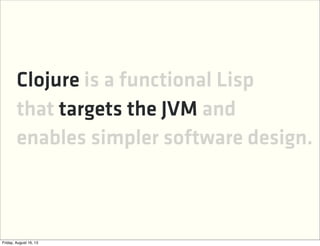










![Implementing
Interfaces
new Runnable()
{
public void run()
{
System.out.println("Hello World");
}
};
(reify Runnable
(run [] (println "Hello")))](https://image.slidesharecdn.com/clojure-plain-and-simple-130816101016-phpapp02/85/Clojure-Plain-and-Simple-34-320.jpg)
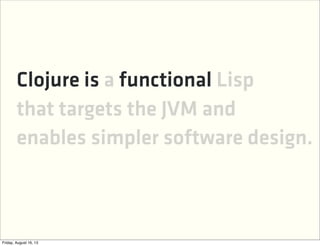






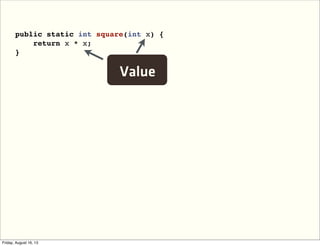






























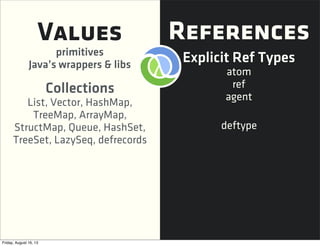






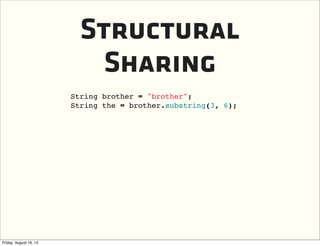








![(def data {:nested [0 1 {:double "nested"}]})
Nesting](https://image.slidesharecdn.com/clojure-plain-and-simple-130816101016-phpapp02/85/Clojure-Plain-and-Simple-89-320.jpg)
![(def data {:nested [0 1 {:double "nested"}]})
(get-in data [:nested 2 :double])
Nesting](https://image.slidesharecdn.com/clojure-plain-and-simple-130816101016-phpapp02/85/Clojure-Plain-and-Simple-90-320.jpg)
![(def data {:nested [0 1 {:double "nested"}]})
(get-in data [:nested 2 :double])
Nesting
First map key Index into vector
Nested map key](https://image.slidesharecdn.com/clojure-plain-and-simple-130816101016-phpapp02/85/Clojure-Plain-and-Simple-91-320.jpg)
![(def data {:nested [0 1 {:double "nested"}]})
(get-in data [:nested 2 :double])
> "nested"
Nesting](https://image.slidesharecdn.com/clojure-plain-and-simple-130816101016-phpapp02/85/Clojure-Plain-and-Simple-92-320.jpg)
![(update-in data [:nested 2 :double] upper-case)
(get-in data [:nested 2 :double])
> "nested"
(def data {:nested [0 1 {:double "nested"}]})
Nesting](https://image.slidesharecdn.com/clojure-plain-and-simple-130816101016-phpapp02/85/Clojure-Plain-and-Simple-93-320.jpg)
![(update-in data [:nested 2 :double] upper-case)
(get-in data [:nested 2 :double])
> "nested"
(def data {:nested [0 1 {:double "nested"}]})
Nesting
Same path](https://image.slidesharecdn.com/clojure-plain-and-simple-130816101016-phpapp02/85/Clojure-Plain-and-Simple-94-320.jpg)
![(update-in data [:nested 2 :double] upper-case)
(get-in data [:nested 2 :double])
> "nested"
(def data {:nested [0 1 {:double "nested"}]})
Nesting
Fn applied to nested value](https://image.slidesharecdn.com/clojure-plain-and-simple-130816101016-phpapp02/85/Clojure-Plain-and-Simple-95-320.jpg)
![(get-in data [:nested 2 :double])
> "nested"
(def data {:nested [0 1 {:double "nested"}]})
Nesting
(update-in data [:nested 2 :double] upper-case)
> {:nested [0 1 {:double "NESTED"}]}
Entire “updated” data is
returned as a value](https://image.slidesharecdn.com/clojure-plain-and-simple-130816101016-phpapp02/85/Clojure-Plain-and-Simple-96-320.jpg)
![(def data {:nested [0 1 {:double "nested"}]})
(get-in data [:nested 2 :double])
> "nested"
Nesting
(update-in data [:nested 2 :double] upper-case)
> {:nested [0 1 {:double "NESTED"}]}
(assoc-in data [:nested 2 :another] "val")](https://image.slidesharecdn.com/clojure-plain-and-simple-130816101016-phpapp02/85/Clojure-Plain-and-Simple-97-320.jpg)
![(def data {:nested [0 1 {:double "nested"}]})
(get-in data [:nested 2 :double])
> "nested"
Nesting
(update-in data [:nested 2 :double] upper-case)
> {:nested [0 1 {:double "NESTED"}]}
(assoc-in data [:nested 2 :another] "val")
New key](https://image.slidesharecdn.com/clojure-plain-and-simple-130816101016-phpapp02/85/Clojure-Plain-and-Simple-98-320.jpg)
![(def data {:nested [0 1 {:double "nested"}]})
(get-in data [:nested 2 :double])
> "nested"
Nesting
(update-in data [:nested 2 :double] upper-case)
> {:nested [0 1 {:double "NESTED"}]}
(assoc-in data [:nested 2 :another] "val")
New value
New key](https://image.slidesharecdn.com/clojure-plain-and-simple-130816101016-phpapp02/85/Clojure-Plain-and-Simple-99-320.jpg)
![(def data {:nested [0 1 {:double "nested"}]})
(get-in data [:nested 2 :double])
> "nested"
Nesting
(update-in data [:nested 2 :double] upper-case)
> {:nested [0 1 {:double "NESTED"}]}
(assoc-in data [:nested 2 :another] "val")
> {:nested [0 1 {:double "nested" :another "val"}]}](https://image.slidesharecdn.com/clojure-plain-and-simple-130816101016-phpapp02/85/Clojure-Plain-and-Simple-100-320.jpg)
![(def data {:nested [0 1 {:double "nested"}]})
(get-in data [:nested 2 :double])
> "nested"
Nesting
(update-in data [:nested 2 :double] upper-case)
> {:nested [0 1 {:double "NESTED"}]}
(assoc-in data [:nested 2 :another] "val")
> {:nested [0 1 {:double "nested" :another "val"}]}
Imagine doing this in Java.](https://image.slidesharecdn.com/clojure-plain-and-simple-130816101016-phpapp02/85/Clojure-Plain-and-Simple-101-320.jpg)



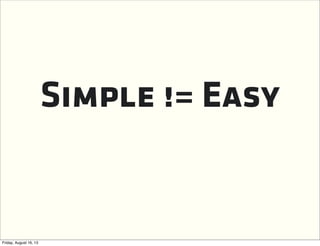
















![public class GameBoard {
!
! private List<ColoredSpace> spaces = new ArrayList<ColoredSpace>();
! private CardDeck cardDeck = new CardDeck();
! private List<Player> players = new ArrayList<Player>();
! // Points to player whose turn it is next
! private int playerPointer = 0;
! // Players position on the board
! private Integer[] playerPositions;
.... }](https://image.slidesharecdn.com/clojure-plain-and-simple-130816101016-phpapp02/85/Clojure-Plain-and-Simple-122-320.jpg)
![public class GameBoard {
!
! private List<ColoredSpace> spaces = new ArrayList<ColoredSpace>();
! private CardDeck cardDeck = new CardDeck();
! private List<Player> players = new ArrayList<Player>();
! // Points to player whose turn it is next
! private int playerPointer = 0;
! // Players position on the board
! private Integer[] playerPositions;
.... }
public class Player {
! private String name;
! public Player(String name) {
! ! this.name = name;
! }
! public String getName() {
! ! return name;
! }
}](https://image.slidesharecdn.com/clojure-plain-and-simple-130816101016-phpapp02/85/Clojure-Plain-and-Simple-123-320.jpg)

![{:players [{:location 32 :name "ben"}
{:location 14 :name "maren"}]
:board
[{:color :purple}
...
{:color :orange, :shortcut-to 62}
....
{:color :yellow, :picture :candy-heart}
...]
:decks
{:unplayed
(:red
[:orange :orange]
:peppermint-stick
...)
:played (:red :blue ...)}}](https://image.slidesharecdn.com/clojure-plain-and-simple-130816101016-phpapp02/85/Clojure-Plain-and-Simple-125-320.jpg)
![{:players [{:location 32 :name "ben"}
{:location 14 :name "maren"}]
:board
[{:color :purple}
...
{:color :orange, :shortcut-to 62}
....
{:color :yellow, :picture :candy-heart}
...]
:decks
{:unplayed
(:red
[:orange :orange]
:peppermint-stick
...)
:played (:red :blue ...)}}
Commas Optional](https://image.slidesharecdn.com/clojure-plain-and-simple-130816101016-phpapp02/85/Clojure-Plain-and-Simple-126-320.jpg)









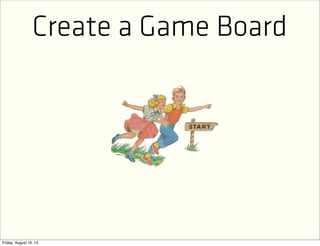


![Create a Game Board
! private static final int NUMBER_SPACES = 129;
! public static String[] COLOR_SEQUENCE = {
! ! "Purple",
! ! "Yellow",
! ! "Blue",
! ! "Orange",
! ! "Green",
! ! "Red"
! };
!](https://image.slidesharecdn.com/clojure-plain-and-simple-130816101016-phpapp02/85/Clojure-Plain-and-Simple-139-320.jpg)
![Create a Game Board
! private static final int NUMBER_SPACES = 129;
! public static String[] COLOR_SEQUENCE = {
! ! "Purple",
! ! "Yellow",
! ! "Blue",
! ! "Orange",
! ! "Green",
! ! "Red"
! };
!
! public GameBoard() {
! ! // Create Spaces
! ! for (int i = 0; i < NUMBER_SPACES; i++) {
! ! ! String color = COLOR_SEQUENCE[i % COLOR_SEQUENCE.length];
! ! ! spaces.add(new ColoredSpace(color));
! ! }
! ! ...
}
! !](https://image.slidesharecdn.com/clojure-plain-and-simple-130816101016-phpapp02/85/Clojure-Plain-and-Simple-140-320.jpg)
![(def colors [:purple :yellow :blue :orange :green :red])](https://image.slidesharecdn.com/clojure-plain-and-simple-130816101016-phpapp02/85/Clojure-Plain-and-Simple-141-320.jpg)
![(def colors [:purple :yellow :blue :orange :green :red])
user> (find-doc "cycle")
-------------------------
clojure.core/check-cyclic-dependency
([path])
Detects ....
-------------------------
clojure.core/cycle
([coll])
Returns a lazy (infinite!) sequence of repetitions of the items in coll.
ProTip, use find-doc to search for fns](https://image.slidesharecdn.com/clojure-plain-and-simple-130816101016-phpapp02/85/Clojure-Plain-and-Simple-142-320.jpg)
![(def colors [:purple :yellow :blue :orange :green :red])
user> (find-doc "cycle")
-------------------------
clojure.core/check-cyclic-dependency
([path])
Detects ....
-------------------------
clojure.core/cycle
([coll])
Returns a lazy (infinite!) sequence of repetitions of the items in coll.](https://image.slidesharecdn.com/clojure-plain-and-simple-130816101016-phpapp02/85/Clojure-Plain-and-Simple-143-320.jpg)
![(def colors [:purple :yellow :blue :orange :green :red])
(cycle colors)
=> (:purple :yellow :blue :orange :green :red :purple
:yellow :blue :orange ...)](https://image.slidesharecdn.com/clojure-plain-and-simple-130816101016-phpapp02/85/Clojure-Plain-and-Simple-144-320.jpg)
![(def colors [:purple :yellow :blue :orange :green :red])
(cycle colors)
=> (:purple :yellow :blue :orange :green :red :purple
:yellow :blue :orange ...)
(take 3 (cycle colors)) => (:purple :yellow :blue)](https://image.slidesharecdn.com/clojure-plain-and-simple-130816101016-phpapp02/85/Clojure-Plain-and-Simple-145-320.jpg)
![(def colors [:purple :yellow :blue :orange :green :red])
(cycle colors)
=> (:purple :yellow :blue :orange :green :red :purple
:yellow :blue :orange ...)
(take 3 (cycle colors)) => (:purple :yellow :blue)
Laziness Increases Modularity](https://image.slidesharecdn.com/clojure-plain-and-simple-130816101016-phpapp02/85/Clojure-Plain-and-Simple-146-320.jpg)
![(def colors [:purple :yellow :blue :orange :green :red])
(cycle colors)
=> (:purple :yellow :blue :orange :green :red :purple
:yellow :blue :orange ...)
(take 3 (cycle colors)) => (:purple :yellow :blue)
Laziness Increases Modularity
for (int i = 0; i < NUMBER_SPACES; i++) {
! ! ! String color = COLOR_SEQUENCE[i % COLOR_SEQUENCE.length];
! ! ! spaces.add(new ColoredSpace(color));
! ! }](https://image.slidesharecdn.com/clojure-plain-and-simple-130816101016-phpapp02/85/Clojure-Plain-and-Simple-147-320.jpg)
![(def colors [:purple :yellow :blue :orange :green :red])
(cycle colors)
=> (:purple :yellow :blue :orange :green :red :purple
:yellow :blue :orange ...)
(take 3 (cycle colors)) => (:purple :yellow :blue)](https://image.slidesharecdn.com/clojure-plain-and-simple-130816101016-phpapp02/85/Clojure-Plain-and-Simple-148-320.jpg)
![(def colors [:purple :yellow :blue :orange :green :red])
(cycle colors)
=> (:purple :yellow :blue :orange :green :red :purple
:yellow :blue :orange ...)
(take 3 (cycle colors)) => (:purple :yellow :blue)
Inside-Out Code](https://image.slidesharecdn.com/clojure-plain-and-simple-130816101016-phpapp02/85/Clojure-Plain-and-Simple-149-320.jpg)
![(def colors [:purple :yellow :blue :orange :green :red])
(cycle colors)
=> (:purple :yellow :blue :orange :green :red :purple
:yellow :blue :orange ...)
(take 3 (cycle colors)) => (:purple :yellow :blue)
Inside-Out Code
(->> (cycle colors) (take 3)) => (:purple :yellow :blue)
Threading Operators](https://image.slidesharecdn.com/clojure-plain-and-simple-130816101016-phpapp02/85/Clojure-Plain-and-Simple-150-320.jpg)
![(def colors [:purple :yellow :blue :orange :green :red])
(cycle colors)
=> (:purple :yellow :blue :orange :green :red :purple
:yellow :blue :orange ...)
(take 3 (cycle colors)) => (:purple :yellow :blue)
(->> (cycle colors) (take 3)) => (:purple :yellow :blue)](https://image.slidesharecdn.com/clojure-plain-and-simple-130816101016-phpapp02/85/Clojure-Plain-and-Simple-151-320.jpg)
![(def colors [:purple :yellow :blue :orange :green :red])
(cycle colors)
=> (:purple :yellow :blue :orange :green :red :purple
:yellow :blue :orange ...)
(take 3 (cycle colors)) => (:purple :yellow :blue)
(->> (cycle colors) (take 3)) => (:purple :yellow :blue)
(defn make-space [color]
{:color color})](https://image.slidesharecdn.com/clojure-plain-and-simple-130816101016-phpapp02/85/Clojure-Plain-and-Simple-152-320.jpg)
![(def colors [:purple :yellow :blue :orange :green :red])
(cycle colors)
=> (:purple :yellow :blue :orange :green :red :purple
:yellow :blue :orange ...)
(take 3 (cycle colors)) => (:purple :yellow :blue)
(->> (cycle colors) (take 3)) => (:purple :yellow :blue)
(defn make-space [color]
{:color color})
(->> colors (map make-space) cycle (take 3))
=> ({:color :purple} {:color :yellow} {:color :blue})](https://image.slidesharecdn.com/clojure-plain-and-simple-130816101016-phpapp02/85/Clojure-Plain-and-Simple-153-320.jpg)
![(def colors [:purple :yellow :blue :orange :green :red])
(cycle colors)
=> (:purple :yellow :blue :orange :green :red :purple
:yellow :blue :orange ...)
(take 3 (cycle colors)) => (:purple :yellow :blue)
(->> (cycle colors) (take 3)) => (:purple :yellow :blue)
(defn make-space [color]
{:color color})
(->> colors (map make-space) cycle (take 3))
=> ({:color :purple} {:color :yellow} {:color :blue})
Small fns can be inlined](https://image.slidesharecdn.com/clojure-plain-and-simple-130816101016-phpapp02/85/Clojure-Plain-and-Simple-154-320.jpg)
![(map make-space)
(defn make-card [color]
{:color color})
(->> colors (map make-space) cycle (take 3))
=> ({:color :purple} {:color :yellow} {:color :blue})
(def colors [:purple :yellow :blue :orange :green :red])
(cycle colors)
=> (:purple :yellow :blue :orange :green :red :purple
:yellow :blue :orange ...)
(take 3 (cycle colors)) => (:purple :yellow :blue)
(->> (cycle colors) (take 3)) => (:purple :yellow :blue)
Small fns can be inlined
(->> colors (map #(array-map :color %)) cycle (take 3))](https://image.slidesharecdn.com/clojure-plain-and-simple-130816101016-phpapp02/85/Clojure-Plain-and-Simple-155-320.jpg)
![(map make-space)
(defn make-card [color]
{:color color})
(->> colors (map make-space) cycle (take 3))
=> ({:color :purple} {:color :yellow} {:color :blue})
(def colors [:purple :yellow :blue :orange :green :red])
(cycle colors)
=> (:purple :yellow :blue :orange :green :red :purple
:yellow :blue :orange ...)
(take 3 (cycle colors)) => (:purple :yellow :blue)
(->> (cycle colors) (take 3)) => (:purple :yellow :blue)
Small fns can be inlined
(->> colors (map #(array-map :color %)) cycle (take 3))
% is the anonymous first param](https://image.slidesharecdn.com/clojure-plain-and-simple-130816101016-phpapp02/85/Clojure-Plain-and-Simple-156-320.jpg)
![(def game-board
(->> [:purple :yellow :blue :orange :green :red]
(map #(array-map :color %))
cycle
(take 129)))
! public GameBoard() {
! ! // Create Spaces
! ! for (int i = 0; i < NUMBER_SPACES; i++) {
! ! ! String color = COLOR_SEQUENCE[i % COLOR_SEQUENCE.length];
! ! ! spaces.add(new ColoredSpace(color));
! ! }
! ! ...
}
! !
Create a Game Board](https://image.slidesharecdn.com/clojure-plain-and-simple-130816101016-phpapp02/85/Clojure-Plain-and-Simple-157-320.jpg)





![(defn next-move
"Takes the game forward one move by drawing a card for the
current player and moving them accordingly."
[game]](https://image.slidesharecdn.com/clojure-plain-and-simple-130816101016-phpapp02/85/Clojure-Plain-and-Simple-163-320.jpg)
![(defn next-move
"Takes the game forward one move by drawing a card for the
current player and moving them accordingly."
[game]
Docstring attached as metadata](https://image.slidesharecdn.com/clojure-plain-and-simple-130816101016-phpapp02/85/Clojure-Plain-and-Simple-164-320.jpg)
![(defn next-move
"Takes the game forward one move by drawing a card for the
current player and moving them accordingly."
[game]
(let [{:keys [decks board player-index players]} game](https://image.slidesharecdn.com/clojure-plain-and-simple-130816101016-phpapp02/85/Clojure-Plain-and-Simple-165-320.jpg)
![(defn next-move
"Takes the game forward one move by drawing a card for the
current player and moving them accordingly."
[game]
(let [{:keys [decks board player-index players]} game
Bind the keys we need with desctructuring](https://image.slidesharecdn.com/clojure-plain-and-simple-130816101016-phpapp02/85/Clojure-Plain-and-Simple-166-320.jpg)
![(defn next-move
"Takes the game forward one move by drawing a card for the
current player and moving them accordingly."
[game]
(let [{:keys [decks board player-index players]} game
player (get players player-index)](https://image.slidesharecdn.com/clojure-plain-and-simple-130816101016-phpapp02/85/Clojure-Plain-and-Simple-167-320.jpg)
![(defn next-move
"Takes the game forward one move by drawing a card for the
current player and moving them accordingly."
[game]
(let [{:keys [decks board player-index players]} game
player (get players player-index)
[card new-decks] (draw-card decks)](https://image.slidesharecdn.com/clojure-plain-and-simple-130816101016-phpapp02/85/Clojure-Plain-and-Simple-168-320.jpg)
![(defn next-move
"Takes the game forward one move by drawing a card for the
current player and moving them accordingly."
[game]
(let [{:keys [decks board player-index players]} game
player (get players player-index)
[card new-decks] (draw-card decks)
Returns a value, pair of [card updated-decks]](https://image.slidesharecdn.com/clojure-plain-and-simple-130816101016-phpapp02/85/Clojure-Plain-and-Simple-169-320.jpg)
![(defn next-move
"Takes the game forward one move by drawing a card for the
current player and moving them accordingly."
[game]
(let [{:keys [decks board player-index players]} game
player (get players player-index)
[card new-decks] (draw-card decks)
We destructure and bind the pair as we like](https://image.slidesharecdn.com/clojure-plain-and-simple-130816101016-phpapp02/85/Clojure-Plain-and-Simple-170-320.jpg)
![(defn next-move
"Takes the game forward one move by drawing a card for the
current player and moving them accordingly."
[game]
(let [{:keys [decks board player-index players]} game
player (get players player-index)
[card new-decks] (draw-card decks)
players-next-location (next-space card board player)]](https://image.slidesharecdn.com/clojure-plain-and-simple-130816101016-phpapp02/85/Clojure-Plain-and-Simple-171-320.jpg)
![(defn next-move
"Takes the game forward one move by drawing a card for the
current player and moving them accordingly."
[game]
(let [{:keys [decks board player-index players]} game
player (get players player-index)
[card new-decks] (draw-card decks)
players-next-location (next-space card board player)]
(-> game
(assoc :decks new-decks
:player-index (-> player-index inc
(mod (count players))))](https://image.slidesharecdn.com/clojure-plain-and-simple-130816101016-phpapp02/85/Clojure-Plain-and-Simple-172-320.jpg)
![(defn next-move
"Takes the game forward one move by drawing a card for the
current player and moving them accordingly."
[game]
(let [{:keys [decks board player-index players]} game
player (get players player-index)
[card new-decks] (draw-card decks)
players-next-location (next-space card board player)]
(-> game
(assoc :decks new-decks
:player-index (-> player-index inc
(mod (count players))))
(assoc-in [:players player-index :location]
players-next-location))))](https://image.slidesharecdn.com/clojure-plain-and-simple-130816101016-phpapp02/85/Clojure-Plain-and-Simple-173-320.jpg)
![(defn next-move
"Takes the game forward one move by drawing a card for the
current player and moving them accordingly."
[game]
(let [{:keys [decks board player-index players]} game
player (get players player-index)
[card new-decks] (draw-card decks)
players-next-location (next-space card board player)]
(-> game
(assoc :decks new-decks
:player-index (-> player-index inc
(mod (count players))))
(assoc-in [:players player-index :location]
players-next-location))))](https://image.slidesharecdn.com/clojure-plain-and-simple-130816101016-phpapp02/85/Clojure-Plain-and-Simple-174-320.jpg)
![Play the game
(defn play [game]
(->> (iterate next-move game)
(filter game-over?)
first))](https://image.slidesharecdn.com/clojure-plain-and-simple-130816101016-phpapp02/85/Clojure-Plain-and-Simple-175-320.jpg)
![(defn play [game]
(filter game-over?)
first))
Play the game
(->> (iterate next-move game)
Text](https://image.slidesharecdn.com/clojure-plain-and-simple-130816101016-phpapp02/85/Clojure-Plain-and-Simple-176-320.jpg)
![(defn play [game]
(filter game-over?)
first))
Play the game
(->> (iterate next-move game)
Text
v1](https://image.slidesharecdn.com/clojure-plain-and-simple-130816101016-phpapp02/85/Clojure-Plain-and-Simple-177-320.jpg)
![(defn play [game]
(filter game-over?)
first))
Play the game
(->> (iterate next-move game)
Text
v1
next-move
v2](https://image.slidesharecdn.com/clojure-plain-and-simple-130816101016-phpapp02/85/Clojure-Plain-and-Simple-178-320.jpg)
![(defn play [game]
(filter game-over?)
first))
Play the game
(->> (iterate next-move game)
Text
v1
next-move
v2 v3
next-move](https://image.slidesharecdn.com/clojure-plain-and-simple-130816101016-phpapp02/85/Clojure-Plain-and-Simple-179-320.jpg)
![(defn play [game]
(filter game-over?)
first))
Play the game
(->> (iterate next-move game)
Text
v1
next-move
v2 v3
next-move next-move
...](https://image.slidesharecdn.com/clojure-plain-and-simple-130816101016-phpapp02/85/Clojure-Plain-and-Simple-180-320.jpg)
![(defn play [game]
(filter game-over?)
first))
Play the game
(->> (iterate next-move game)
Text
v1
next-move
v2 v3
next-move next-move
...
(->> 1 (iterate inc) (take 5))
> (1 2 3 4 5)](https://image.slidesharecdn.com/clojure-plain-and-simple-130816101016-phpapp02/85/Clojure-Plain-and-Simple-181-320.jpg)
![Play the game
(defn play [game]
(->> (iterate next-move game)
(filter game-over?)
first))
(filter game-over?)
first))
Predicate function](https://image.slidesharecdn.com/clojure-plain-and-simple-130816101016-phpapp02/85/Clojure-Plain-and-Simple-182-320.jpg)
![Play the game
(defn play [game]
(->> (iterate next-move game)
(filter game-over?)
first))
(filter game-over?)
first))
Return the ended game value](https://image.slidesharecdn.com/clojure-plain-and-simple-130816101016-phpapp02/85/Clojure-Plain-and-Simple-183-320.jpg)
![Play the game
(defn play [game]
(->> (iterate next-move game)
(filter game-over?)
first))
public void play() {
! ! while (nextTurn());
! ! System.out.println(“The winning player is:”
+ players.get(playerPointer).getName());
! }](https://image.slidesharecdn.com/clojure-plain-and-simple-130816101016-phpapp02/85/Clojure-Plain-and-Simple-184-320.jpg)
![Play the game
(defn play [game]
(->> (iterate next-move game)
(filter game-over?)
first))
(->> (create-game ["Ben" "Maren"])
play
winning-player
:name
(println "The winning player is:"))
public void play() {
! ! while (nextTurn());
! ! System.out.println(“The winning player is:”
+ players.get(playerPointer).getName());
! }](https://image.slidesharecdn.com/clojure-plain-and-simple-130816101016-phpapp02/85/Clojure-Plain-and-Simple-185-320.jpg)
![Play the game
(defn play [game]
(->> (iterate next-move game)
(filter game-over?)
first))
(->> (create-game ["Ben" "Maren"])
play
winning-player
:name
(println "The winning player is:"))
public void play() {
! ! while (nextTurn());
! ! System.out.println(“The winning player is:”
+ players.get(playerPointer).getName());
! }
Our first side effect!](https://image.slidesharecdn.com/clojure-plain-and-simple-130816101016-phpapp02/85/Clojure-Plain-and-Simple-186-320.jpg)




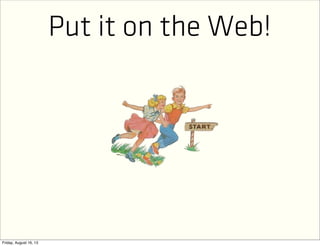
![{:players [{:location 32, :name "ben"}
{:location 14, :name "maren"}]
:board
[{:color :purple}
...
{:color :orange, :shortcut-to 62}
....
{:color :yellow, :picture :candy-heart}
...],
:decks
{:unplayed
(:red
[:orange :orange]
:peppermint-stick
...),
:played (:red, :blue, ...)},
:began-at #inst "2013-08-08T07:29:30.134-00:00"}](https://image.slidesharecdn.com/clojure-plain-and-simple-130816101016-phpapp02/85/Clojure-Plain-and-Simple-192-320.jpg)
![{"players" : [ {"location" : 32,"name" : "ben"},
{"location" : 14,"name" : "maren"} ],
"board" : [{"color" : "purple"},
...
{"color" : "orange","shortcut-to" : 62},
...
{"color" : "yellow","picture" : "candy-heart"}
... ],
"decks" : {
"unplayed" : [ "red", ["orange", "orange"],
"peppermint-stick", ...],
"played" : [ "red", "blue" ...]
},
"began-at" : "2013-08-08T07:29:30Z"}](https://image.slidesharecdn.com/clojure-plain-and-simple-130816101016-phpapp02/85/Clojure-Plain-and-Simple-193-320.jpg)

![{:players [{:location 32, :name "ben"}
{:location 14, :name "maren"}]
:board
[{:color :purple}
...
{:color :orange, :shortcut-to 62}
....
{:color :yellow, :picture :candy-heart}
...],
:decks
{:unplayed
(:red
[:orange :orange]
:peppermint-stick
...),
:played (:red, :blue, ...)},
:began-at #inst "2013-08-08T07:29:30.134-00:00"}](https://image.slidesharecdn.com/clojure-plain-and-simple-130816101016-phpapp02/85/Clojure-Plain-and-Simple-195-320.jpg)
![{:players [{:location 32, :name "ben"}
{:location 14, :name "maren"}]
:board
[{:color :purple}
...
{:color :orange, :shortcut-to 62}
....
{:color :yellow, :picture :candy-heart}
...],
:decks
{:unplayed
(:red
[:orange :orange]
:peppermint-stick
...),
:played (:red, :blue, ...)},
:began-at #inst "2013-08-08T07:29:30.134-00:00"}
Custom Tagged Literal](https://image.slidesharecdn.com/clojure-plain-and-simple-130816101016-phpapp02/85/Clojure-Plain-and-Simple-196-320.jpg)
![{:id 54321
:players [{:location 32 :name "ben"}
{:location 14 :name "maren"}]
:board
[{:color :purple}
...
{:color :orange, :shortcut-to 62}
....
{:color :yellow, :picture :candy-heart}
...]
:decks
{:unplayed
(:red
[:orange :orange]
:peppermint-stick
...)
:played (:red :blue ...)}
:began-at #inst "2013-08-08T07:29:30.134-00:00"}](https://image.slidesharecdn.com/clojure-plain-and-simple-130816101016-phpapp02/85/Clojure-Plain-and-Simple-197-320.jpg)










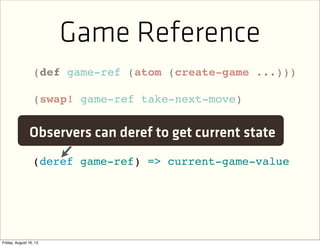









![(defn next-location [card board player]
(let [spaces-after-player (->> board (drop (:location player)))
next-color-id (find-index #(= (:color card) (:color %)))]
(or next-color-id (:winning-location board))))](https://image.slidesharecdn.com/clojure-plain-and-simple-130816101016-phpapp02/85/Clojure-Plain-and-Simple-218-320.jpg)
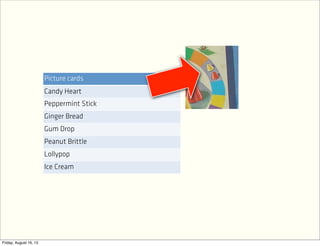
![(defn next-location [card board player]
(let [spaces-after-player (->> board (drop (:location player)))
next-color-id (find-index #(= (:color card) (:color %)))]
(or next-color-id (:winning-location board))))](https://image.slidesharecdn.com/clojure-plain-and-simple-130816101016-phpapp02/85/Clojure-Plain-and-Simple-220-320.jpg)
![(defprotocol Card
(next-location [card board player]
"Determines the next location of the player"))](https://image.slidesharecdn.com/clojure-plain-and-simple-130816101016-phpapp02/85/Clojure-Plain-and-Simple-221-320.jpg)
![(defrecord ColorCard [color]
Card
(next-location [_ board player]
....)
(defrecord PictureCard [picture]
Card
(next-location [_ board player]
(find-index #(= picture (:picture %)) board)))
....
(defprotocol Card
(next-location [card board player]
"Determines the next location of the player"))](https://image.slidesharecdn.com/clojure-plain-and-simple-130816101016-phpapp02/85/Clojure-Plain-and-Simple-222-320.jpg)


![(ns abstraction-a)
(defprotocol AbstractionA
(foo [obj]))](https://image.slidesharecdn.com/clojure-plain-and-simple-130816101016-phpapp02/85/Clojure-Plain-and-Simple-225-320.jpg)
![(extend-protocol AbstractionA
nil
(foo [s] (str "foo-A!"))
String
(foo [s] (str "foo-A-" (.toUpperCase s))))
(ns abstraction-a)
(defprotocol AbstractionA
(foo [obj]))](https://image.slidesharecdn.com/clojure-plain-and-simple-130816101016-phpapp02/85/Clojure-Plain-and-Simple-226-320.jpg)
![(extend-protocol AbstractionA
nil
(foo [s] (str "foo-A!"))
String
(foo [s] (str "foo-A-" (.toUpperCase s))))
(ns abstraction-a)
(defprotocol AbstractionA
(foo [obj])) (in-ns 'user)
(require '[abstraction-a :as a])
(a/foo "Bar") => "foo-A-BAR"
(a/foo nil) => "foo-A!"](https://image.slidesharecdn.com/clojure-plain-and-simple-130816101016-phpapp02/85/Clojure-Plain-and-Simple-227-320.jpg)
![(extend-protocol AbstractionA
nil
(foo [s] (str "foo-A!"))
String
(foo [s] (str "foo-A-" (.toUpperCase s))))
(ns abstraction-a)
(defprotocol AbstractionA
(foo [obj])) (in-ns 'user)
(require '[abstraction-a :as a])
(a/foo "Bar") => "foo-A-BAR"
(a/foo nil) => "foo-A!"
(ns abstraction-b)
(defprotocol AbstractionB
(foo [obj]))](https://image.slidesharecdn.com/clojure-plain-and-simple-130816101016-phpapp02/85/Clojure-Plain-and-Simple-228-320.jpg)
![(extend-protocol AbstractionA
nil
(foo [s] (str "foo-A!"))
String
(foo [s] (str "foo-A-" (.toUpperCase s))))
(ns abstraction-a)
(defprotocol AbstractionA
(foo [obj])) (in-ns 'user)
(require '[abstraction-a :as a])
(a/foo "Bar") => "foo-A-BAR"
(a/foo nil) => "foo-A!"
(extend-protocol AbstractionB
nil
(foo [s] (str "foo-B!"))
String
(foo [s] (str "foo-B-" (.toLowerCase s))))
(ns abstraction-b)
(defprotocol AbstractionB
(foo [obj]))](https://image.slidesharecdn.com/clojure-plain-and-simple-130816101016-phpapp02/85/Clojure-Plain-and-Simple-229-320.jpg)
![(extend-protocol AbstractionA
nil
(foo [s] (str "foo-A!"))
String
(foo [s] (str "foo-A-" (.toUpperCase s))))
(ns abstraction-a)
(defprotocol AbstractionA
(foo [obj])) (in-ns 'user)
(require '[abstraction-a :as a])
(a/foo "Bar") => "foo-A-BAR"
(a/foo nil) => "foo-A!"
(extend-protocol AbstractionB
nil
(foo [s] (str "foo-B!"))
String
(foo [s] (str "foo-B-" (.toLowerCase s))))
(ns abstraction-b)
(defprotocol AbstractionB
(foo [obj]))
(in-ns 'user)
(require '[abstraction-b :as b])
(b/foo "Bar") => "foo-B-bar"
(b/foo nil) => "foo-B!"](https://image.slidesharecdn.com/clojure-plain-and-simple-130816101016-phpapp02/85/Clojure-Plain-and-Simple-230-320.jpg)
![(extend-protocol AbstractionA
nil
(foo [s] (str "foo-A!"))
String
(foo [s] (str "foo-A-" (.toUpperCase s))))
(ns abstraction-a)
(defprotocol AbstractionA
(foo [obj])) (in-ns 'user)
(require '[abstraction-a :as a])
(a/foo "Bar") => "foo-A-BAR"
(a/foo nil) => "foo-A!"
(extend-protocol AbstractionB
nil
(foo [s] (str "foo-B!"))
String
(foo [s] (str "foo-B-" (.toLowerCase s))))
(ns abstraction-b)
(defprotocol AbstractionB
(foo [obj]))
(in-ns 'user)
(require '[abstraction-b :as b])
(b/foo "Bar") => "foo-B-bar"
(b/foo nil) => "foo-B!"
Polymorphic functions
live in namespaces, not
complected on Class](https://image.slidesharecdn.com/clojure-plain-and-simple-130816101016-phpapp02/85/Clojure-Plain-and-Simple-231-320.jpg)







![(require '[clojure.core.reducers :as r])
(->> (range 100000)
(r/map inc)
(r/reduce +))
(->> (range 100000)
(map inc)
(reduce +))](https://image.slidesharecdn.com/clojure-plain-and-simple-130816101016-phpapp02/85/Clojure-Plain-and-Simple-239-320.jpg)
![(require '[clojure.core.reducers :as r])
(->> (range 100000)
(r/map inc)
(r/reduce +))
(->> (range 100000)
(map inc)
(reduce +))
Process sequences in
parallel with ForkJoin](https://image.slidesharecdn.com/clojure-plain-and-simple-130816101016-phpapp02/85/Clojure-Plain-and-Simple-240-320.jpg)
![(require '[clojure.core.reducers :as r])
(->> (range 100000)
(r/map inc)
(r/reduce +))
(->> (range 100000)
(map inc)
(reduce +))
Process sequences in
parallel with ForkJoin
The same “what”,
different “how”](https://image.slidesharecdn.com/clojure-plain-and-simple-130816101016-phpapp02/85/Clojure-Plain-and-Simple-241-320.jpg)
![(extend-protocol CollFold
nil
(coll-fold
[coll n combinef reducef]
(combinef))
Object
(coll-fold
[coll n combinef reducef]
;;can't fold, single reduce
(reduce reducef (combinef) coll))
clojure.lang.IPersistentVector
(coll-fold
[v n combinef reducef]
(foldvec v n combinef reducef))
clojure.lang.PersistentHashMap
(coll-fold
[m n combinef reducef]
(.fold m n combinef reducef fjinvoke fjtask fjfork fjjoin)))](https://image.slidesharecdn.com/clojure-plain-and-simple-130816101016-phpapp02/85/Clojure-Plain-and-Simple-242-320.jpg)







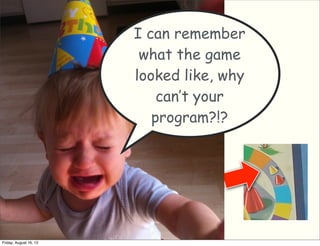
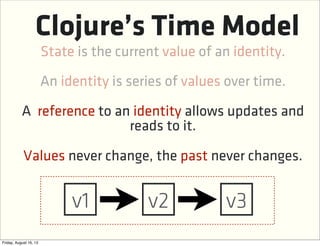

![(defn shadow-ref
"Returns a ref that contains the time - 1 value of the given ref.
In other words, shawdow-ref contains the value of ref before the las
update to it (e.g. swap!). "
[ref]
(let [shadow (atom nil)]
(add-watch ref :shawdower
(fn [_key _ref old-state _new-state]
(reset! shadow old-state)))
shadow))
(def old-game-ref (shadow-ref game-ref))](https://image.slidesharecdn.com/clojure-plain-and-simple-130816101016-phpapp02/85/Clojure-Plain-and-Simple-253-320.jpg)
![(defn undo-and-skip-card [game-ref old-game-ref]
(let [alternate-reality (-> @old-game-ref
skip-card
take-next-move)]
(reset! game-ref alternate-reality)))
(defn shadow-ref
"Returns a ref that contains the time - 1 value of the given ref.
In other words, shawdow-ref contains the value of ref before the las
update to it (e.g. swap!). "
[ref]
(let [shadow (atom nil)]
(add-watch ref :shawdower
(fn [_key _ref old-state _new-state]
(reset! shadow old-state)))
shadow))
(def old-game-ref (shadow-ref game-ref))](https://image.slidesharecdn.com/clojure-plain-and-simple-130816101016-phpapp02/85/Clojure-Plain-and-Simple-254-320.jpg)













![C# Async
async void Go() {
_button.IsEnabled = false;
string[] urls = "clojure.org www.albahari.com/nutshell/
golang.org".Split();
int totalLength = 0;
foreach (string url in urls)
{
var uri = new Uri ("http://" + url);
byte[] data = await new WebClient().DownloadDataTaskAsync (uri);
_results.Text += "Length of " + url + " is " + data.Length +
totalLength += data.Length;
}
_results.Text += "Total length: " + totalLength;
}](https://image.slidesharecdn.com/clojure-plain-and-simple-130816101016-phpapp02/85/Clojure-Plain-and-Simple-268-320.jpg)
![CSP in Go// Run the Web, Image, and Video searches concurrently,
// and wait for all results.
// No locks. No condition variables. No callbacks.
func Google(query string) (results []Result) {
c := make(chan Result)
go func() { c <- Web(query) } ()
go func() { c <- Image(query) } ()
go func() { c <- Video(query) } ()
for i := 0; i < 3; i++ {
result := <-c
results = append(results, result)
}
return
}
// http://talks.golang.org/2012/concurrency.slide#46](https://image.slidesharecdn.com/clojure-plain-and-simple-130816101016-phpapp02/85/Clojure-Plain-and-Simple-269-320.jpg)
![Go in Clojure
(use 'clojure.core.async)
(defn google [query]
(let [c (chan)]
(go (>! c (<! (web query))))
(go (>! c (<! (image query))))
(go (>! c (<! (video query))))
(go (loop [i 0 ret []]
(if (= i 3)
ret
(recur (inc i) (conj ret (alt! [c t] ([v] v)))))))))](https://image.slidesharecdn.com/clojure-plain-and-simple-130816101016-phpapp02/85/Clojure-Plain-and-Simple-270-320.jpg)



![Erlang Actors in
Clojure
;; http://puniverse.github.io/pulsar/
(use 'co.paralleluniverse.pulsar.core)
(let [actor (spawn
#(receive
:abc "yes!"
[:why? answer] answer
:else "oy"))]
(! actor [:why? "because!"])
(join actor)) ; => "because!"](https://image.slidesharecdn.com/clojure-plain-and-simple-130816101016-phpapp02/85/Clojure-Plain-and-Simple-274-320.jpg)




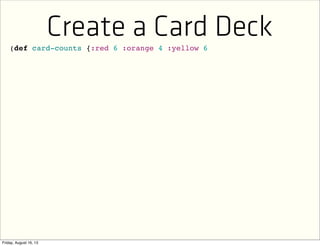


![Create a Card Deck(def card-counts {:red 6 :orange 4 :yellow 6
:green 4 :blue 6 :purple 4})
(repeat 3 :red) => (:red :red :red)
(map (fn [pair] (repeat (last pair) (first pair))) {:red 2 :blue
2})=> ((:red :red) (:blue :blue))](https://image.slidesharecdn.com/clojure-plain-and-simple-130816101016-phpapp02/85/Clojure-Plain-and-Simple-282-320.jpg)
![Create a Card Deck(def card-counts {:red 6 :orange 4 :yellow 6
:green 4 :blue 6 :purple 4})
(repeat 3 :red) => (:red :red :red)
(map (fn [pair] (repeat (last pair) (first pair))) {:red 2 :blue
2})=> ((:red :red) (:blue :blue))
(map (fn [[face freq]] (repeat freq face)) {:red 2 :blue 2}) =>
((:red :red) (:blue :blue))](https://image.slidesharecdn.com/clojure-plain-and-simple-130816101016-phpapp02/85/Clojure-Plain-and-Simple-283-320.jpg)
![Create a Card Deck(def card-counts {:red 6 :orange 4 :yellow 6
:green 4 :blue 6 :purple 4})
(repeat 3 :red) => (:red :red :red)
(map (fn [pair] (repeat (last pair) (first pair))) {:red 2 :blue
2})=> ((:red :red) (:blue :blue))
(map (fn [[face freq]] (repeat freq face)) {:red 2 :blue 2}) =>
((:red :red) (:blue :blue))
(mapcat (fn [[face freq]] (repeat freq face)) {:red 2 :blue 2}) =>
(:red :red :blue :blue)](https://image.slidesharecdn.com/clojure-plain-and-simple-130816101016-phpapp02/85/Clojure-Plain-and-Simple-284-320.jpg)
![Create a Card Deck(def card-counts {:red 6 :orange 4 :yellow 6
:green 4 :blue 6 :purple 4})
(repeat 3 :red) => (:red :red :red)
(map (fn [pair] (repeat (last pair) (first pair))) {:red 2 :blue
2})=> ((:red :red) (:blue :blue))
(map (fn [[face freq]] (repeat freq face)) {:red 2 :blue 2}) =>
((:red :red) (:blue :blue))
(mapcat (fn [[face freq]] (repeat freq face)) {:red 2 :blue 2}) =>
(:red :red :blue :blue)
(defn create-deck [face-freqs]](https://image.slidesharecdn.com/clojure-plain-and-simple-130816101016-phpapp02/85/Clojure-Plain-and-Simple-285-320.jpg)
![Create a Card Deck(def card-counts {:red 6 :orange 4 :yellow 6
:green 4 :blue 6 :purple 4})
(repeat 3 :red) => (:red :red :red)
(map (fn [pair] (repeat (last pair) (first pair))) {:red 2 :blue
2})=> ((:red :red) (:blue :blue))
(map (fn [[face freq]] (repeat freq face)) {:red 2 :blue 2}) =>
((:red :red) (:blue :blue))
(mapcat (fn [[face freq]] (repeat freq face)) {:red 2 :blue 2}) =>
(:red :red :blue :blue)
(defn create-deck [face-freqs]
(mapcat (fn [[face freq]] (repeat freq face)) face-freqs))](https://image.slidesharecdn.com/clojure-plain-and-simple-130816101016-phpapp02/85/Clojure-Plain-and-Simple-286-320.jpg)
![Create a Card Deck(def card-counts {:red 6 :orange 4 :yellow 6
:green 4 :blue 6 :purple 4})
(repeat 3 :red) => (:red :red :red)
(map (fn [pair] (repeat (last pair) (first pair))) {:red 2 :blue
2})=> ((:red :red) (:blue :blue))
(map (fn [[face freq]] (repeat freq face)) {:red 2 :blue 2}) =>
((:red :red) (:blue :blue))
(mapcat (fn [[face freq]] (repeat freq face)) {:red 2 :blue 2}) =>
(:red :red :blue :blue)
(defn create-deck [face-freqs]
(mapcat (fn [[face freq]] (repeat freq face)) face-freqs))
(def deck](https://image.slidesharecdn.com/clojure-plain-and-simple-130816101016-phpapp02/85/Clojure-Plain-and-Simple-287-320.jpg)
![Create a Card Deck(def card-counts {:red 6 :orange 4 :yellow 6
:green 4 :blue 6 :purple 4})
(repeat 3 :red) => (:red :red :red)
(map (fn [pair] (repeat (last pair) (first pair))) {:red 2 :blue
2})=> ((:red :red) (:blue :blue))
(map (fn [[face freq]] (repeat freq face)) {:red 2 :blue 2}) =>
((:red :red) (:blue :blue))
(mapcat (fn [[face freq]] (repeat freq face)) {:red 2 :blue 2}) =>
(:red :red :blue :blue)
(defn create-deck [face-freqs]
(mapcat (fn [[face freq]] (repeat freq face)) face-freqs))
(def deck
(create-deck card-counts))](https://image.slidesharecdn.com/clojure-plain-and-simple-130816101016-phpapp02/85/Clojure-Plain-and-Simple-288-320.jpg)

![Create a Card Deck
! private void addCardsToDeck() {
! ! cards = new Stack<Card>();
! ! // Add cards to deck based on color and number
! ! for (Map.Entry<S,I> cardGroupEntry : CARD_GROUPS.entrySet()) {
! ! ! String color = cardGroupEntry.getKey();
! ! ! int numCardsInGroup = cardGroupEntry.getValue();
! ! ! for (int i = 0; i < numCardsInGroup; i++) {
! ! ! ! cards.push(new Card(color));
! ! ! }
! ! }
! }
(defn create-deck [face-freqs]
(mapcat (fn [[face freq]] (repeat freq face)) face-freqs))](https://image.slidesharecdn.com/clojure-plain-and-simple-130816101016-phpapp02/85/Clojure-Plain-and-Simple-290-320.jpg)